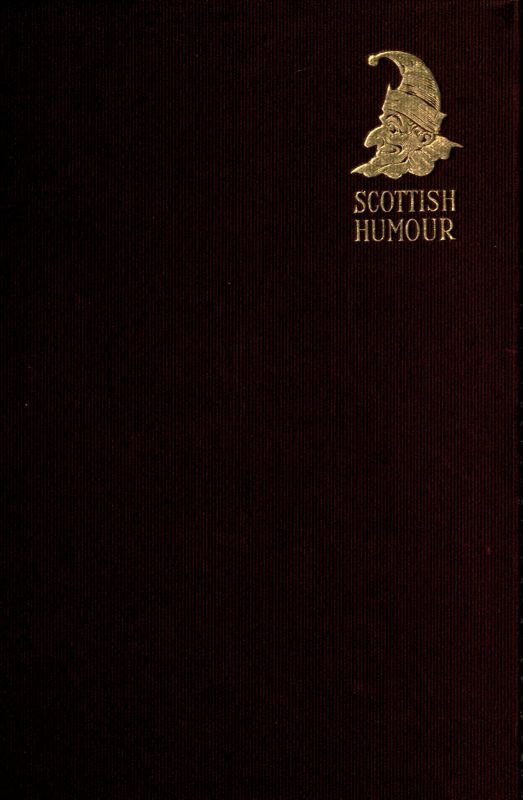
The Project Gutenberg EBook of Mr. Punch's Scottish Humour, by Various This eBook is for the use of anyone anywhere in the United States and most other parts of the world at no cost and with almost no restrictions whatsoever. You may copy it, give it away or re-use it under the terms of the Project Gutenberg License included with this eBook or online at www.gutenberg.org. If you are not located in the United States, you'll have to check the laws of the country where you are located before using this ebook. Title: Mr. Punch's Scottish Humour Author: Various Release Date: June 28, 2015 [EBook #49309] Language: English Character set encoding: UTF-8 *** START OF THIS PROJECT GUTENBERG EBOOK MR. PUNCH'S SCOTTISH HUMOUR *** Produced by Chris Curnow, Elisa and the Online Distributed Proofreading Team at http://www.pgdp.net (This file was produced from images generously made available by The Internet Archive)

PUNCH LIBRARY OF HUMOUR
Edited by J. A. Hammerton
![]() Designed to provide in a series
of volumes, each complete in itself,
the cream of our national humour,
contributed by the masters of
comic draughtsmanship and the
leading wits of the age to “Punch,”
from its beginning in 1841 to the
present day.
Designed to provide in a series
of volumes, each complete in itself,
the cream of our national humour,
contributed by the masters of
comic draughtsmanship and the
leading wits of the age to “Punch,”
from its beginning in 1841 to the
present day.
![]()

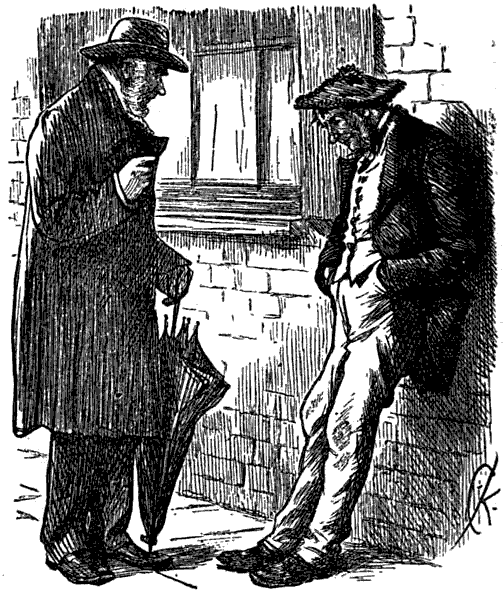
“BACKSLIDING”
The Minister (reproachfully). “Ah, James! I’m sorry to see this! I thought you were a steadfast teetotaller!”
James. “Sho I am, sir. But I’m no a bigoted ane!”
MR. PUNCH’S
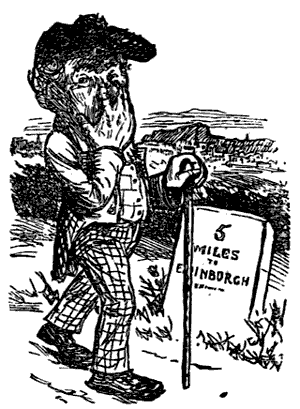
SCOTTISH
HUMOUR
WITH 132 ILLUSTRATIONS
BY
CHARLES KEENE, GEORGE DU MAURIER, W. RALSTON, A. S. BOYD, PHIL MAY, E. T. REED, HARRY FURNISS, J. BERNARD PARTRIDGE, JAMES GREIG, L. RAVENHILL, G. D. ARMOUR, AND OTHERS
PUBLISHED BY ARRANGEMENT WITH
THE PROPRIETORS OF “PUNCH”
THE EDUCATIONAL BOOK CO. LTD.
Punch Library of Humour
Twenty-five volumes, crown 8vo, 192 pages fully illustrated
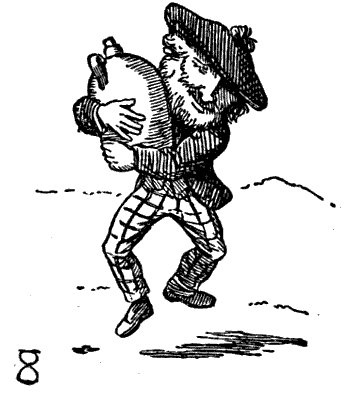
An English friend of ours called many years ago at Inverness Post Office for some letters awaiting him there. They were addressed to the Poste Restante, “Inverness, N.B.” In handing him the letters, an elderly lady who then graced the postal staff remarked: “You micht tell your freen’s that ‘N.B.’ is quite superfluous. Hoo wad they like us to write ‘London, S.B.’? And we don’t think that muckle o’ London up here.” Now, whether we use “N.B.” as meaning “North Britain,” or “Nota Bene,” we shall leave you to guess!
Unless we are mistaken, we have seen more than once in English papers a suggestion that the Scots are a race devoid of humour. “He joked wi’ deeficulty” is, we believe, a reference to a Scotsman. “A surgical——.” But no, we shall not repeat that! Oddly enough, the pages of Mr. Punch, true mirror of our national characteristics, yield an abundant harvest of Scottish humour. Have we not already in this same series made merry with “Mr. Punch in the Highlands”? And we are now to laugh with him again at this banquet of Scottish humour, which by no means exhausts his store. We have already heard that some seventy-five per cent. of the jokes appearing in Punch contributed by those not on the permanent staff come from Scotsmen; so it is a reasonable assumption that the bulk of the anecdotes in the present collection have originated north of the border, even when they tell against the Scot; for it is not the least of his good points that Sandy is able[6] to appreciate a story that does not present him in the most favourable light. No humour in Scotland! Here is Mr. Punch’s reply!
Let this be noted by the Southerner: there is much confusion as to the Highlander and the Lowlander. Here is not the place, even did space allow, to attempt a definition of the difference between the two races which Sir Walter Scott typifies in Rob Roy and in Bailie Nicol Jarvie. In “Mr. Punch in the Highlands” we have something of the humour of the one; here we have a good deal of the humour of the other.
Of course a portion of the present book would be properly described as “the Scot through English glasses,” and in this respect it is none the less valuable, being the next best thing to that for which Burns sighed—
Mr. Punch has striven to leave the Scot with no illusions as to the characteristics he presents to his fellow Britons. We may gather from these pages that Mr. Punch, as spokesman for John Bull, has detected in Sandy an occasional affection for that whisky which he produces so industriously—and chiefly for English consumption—and that he has noted in him a certain inclination “to keep the Sabbath day—and everything else he can lay his hands on.” Who shall say that Mr. Punch has been mistaken? But we are not here to moralise; mirth is our motive; and if the fun be good—as none will deny who fingers these pages—enough is said.
This, at least, we may add: No artist who has ever been on Mr. Punch’s staff has made anything like so much of the dry, pawky humour that obtains north of the Tweed as did Charles Keene. More than fifty per cent. of Mr. Punch’s illustrations of Scottish humour come from his pencil; and he is ahead of his confrères not only in quantity but in quality—none of them has beaten him in the pictorial representation of Scottish character. The shrewd, dour faces of some of his Scotsmen are inimitable.
MR. PUNCH’S
SCOTTISH HUMOUR
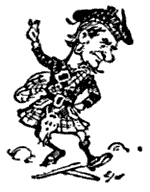
Maxim for Young Scotsmen who are Fond of Dancing.—“Youth must have its fling.”
A Bitter Disappointment.—Being served with a glass of Bass when you called for old Edinburgh.
Motto for Highland Pipers.—“Blow Gentle, Gaels.”
“Breaches of Decorum.”—A Highlander’s trousers.
Confession of a Whiskey Drinker.—“Scotland, with all thy faults, I love thy still.”
[“He is a Scotsman and therefore fundamentally inept.”—The Tiger.]
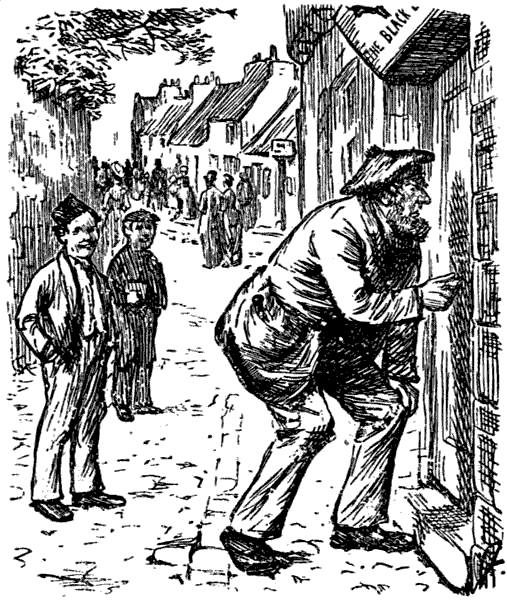
CANDID
Tam (very dry, at door of country inn, Sunday morning). “Aye, man, ye micht gie me a bit gill oot in a bottle!”
Landlord (from within). “Weel, ye ken, Tammas, I daurna sell onything the day. And forbye ye got a half-mutchkin awa’ wi’ ye last nicht (after hoors tae); it canna be a’ dune yet!”
Tam. “Dune! Losh, man, d’ye think I could sleep an’ whusky i’ the hoose?!”
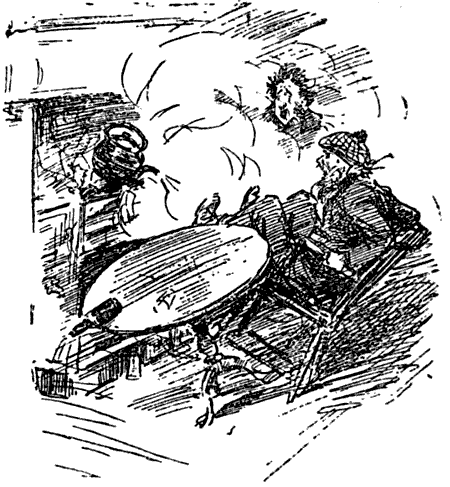
“A NICHT WI’ BURNS”
Good Name for a Scots Policeman.—Macnab.
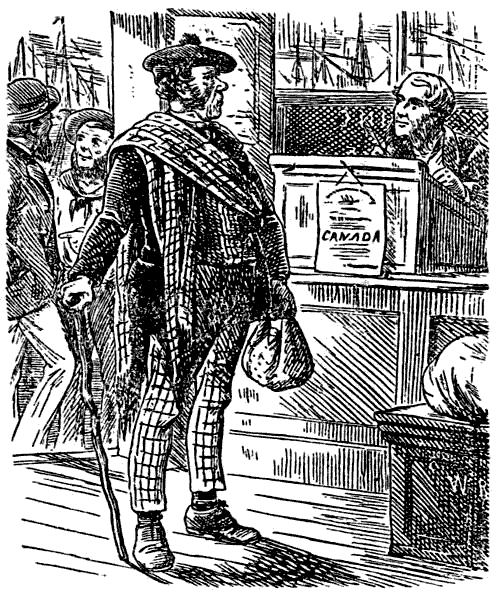
STANDING ON HIS DIGNITY
Shipping Agent. “Are you a mechanic?”
Intending Emigrant (justly indignant). “No!—I’m a Macpherson!”
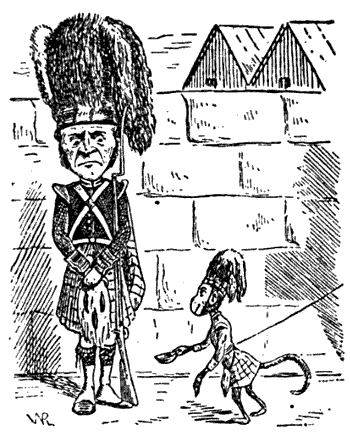
Old Scots Slang.—In an old Scots Act of Parliament “anent the punishment of drunkards” a clause adjudges all persons “convict” of drunkenness, or tavern-haunting, “for the first fault” to a fine of £3, “or in case of inability or refusal, to be put in jogges or jayle for the space of six hours.” What was “jogges,” as distinguished from “jayle”? Possibly a somewhat milder place of detention for the rather, than that appointed for the very, drunken. If so, “jogges,” in the lapse of time, we may suppose, having lost its distinctive sense, came to be regarded as simply a synonym of “jayle,” and, as such, now passes current in the People’s English (not to say the Queen’s) abbreviated into the contraction “jug.” Thus imprisonment for a state of too much beer might be described as jug for jug.

ILLUSIONS!
McStaggert (on his way home, having jumped over the shadows of the lamp-posts, &c., brought up by that of the kirk steeple). “E——h!” (Pauses.) “Ne’ mind! ’Sh no help for it.” (Pulls up his pants.) “Shall have to wade thish!”
(On reading that an Act of the Australian Legislature against the Growth of Thistles received the Royal Assent)
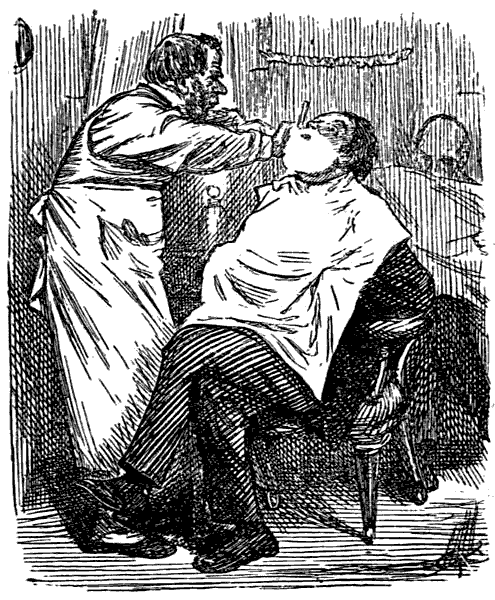
WELL TURNED
Minister (reproachfully, to bibulous village barber with shaking hand). “Ah, John, John! That whisky——”!
Barber (condolently). “Aye, sir, it mak’s the skin unco tender!”
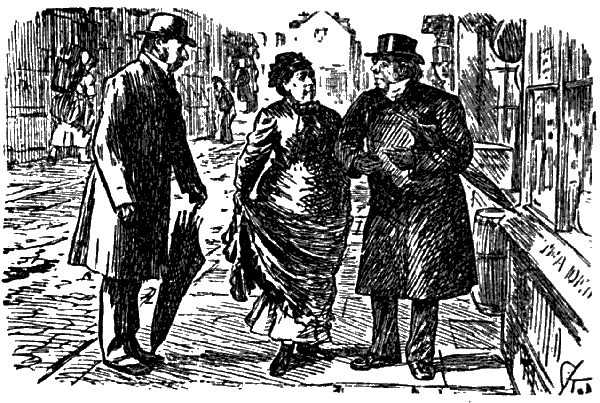
“AU PIED DE LA LETTRE”
Free-Kirk Minister (to his “Elder”). “John, I should like you to intimate that on Monday next I propose paying pastoral visits in the High and North Streets, in which I also hope to embrace all the servant girls of the congregation in that district!”
His Wife (whom he’d lately married from the South). “You shall do nothing of the kind, sir! Let me see you dare to——!”
[Goes into hysterics!
Geographical.—Examiner (to Scots boy in Free School). Where is the village of Drum?
Scots Boy (readily). In the county of Fife.
[Prize given.
Stop Him!—A Scots gentleman puts the postage stamps wrong way up on his letters, and calls it, with a tender feeling,—Turning a penny!
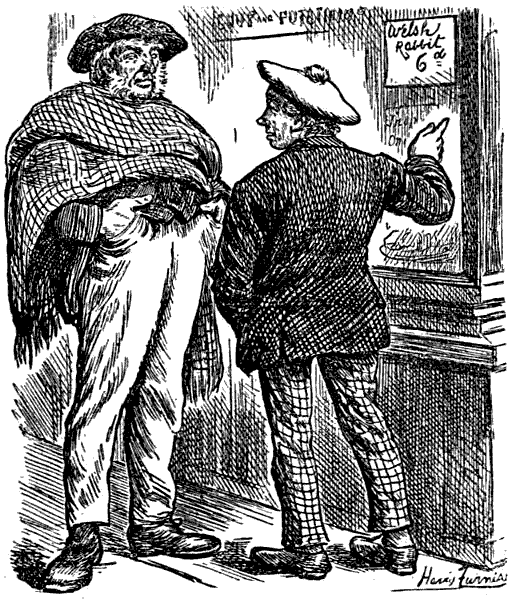
Hungry Visitor (ignorant of the nature of this particular delicacy). “Ah, Donal, mon, we ken weel hae the rabbit for saxpence. We ken get twa bawbees fur the skeen when we get back to Glasgow!”
Seasonable Weather in Scotland.—(Edinburgh, New Year’s Day.) Sandy. There’s mair snaw this new year than I’ve seen for mony a day; it’s by ord’nar.
Jock. Ay, but it’s vera saisonable wather.
Sandy. ’Deed, ye may say that, Jock,—fine saft fa’in for the fou folk.
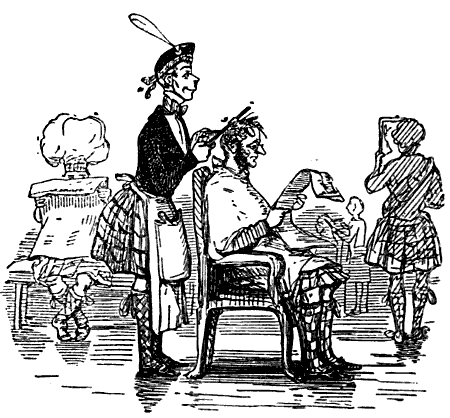
CURLING ON THE ICE IN SCOTLAND.
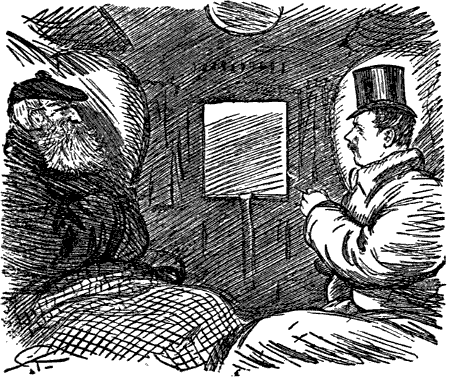
HIGHLY CONSIDERATE
Little Smithkin (debonairly). “Object to smoking?”
North Briton. “Nae in the least, if it does na’ mak’ ye seek!”
[As Little S. said, he “cut the old cad for the rest of the journey.”
The Gallant Scots.—As a party of very pretty girls approached the camp of the Royal Scottish at Wimbledon, the band struck up—“The Camp-belles are Coming!”
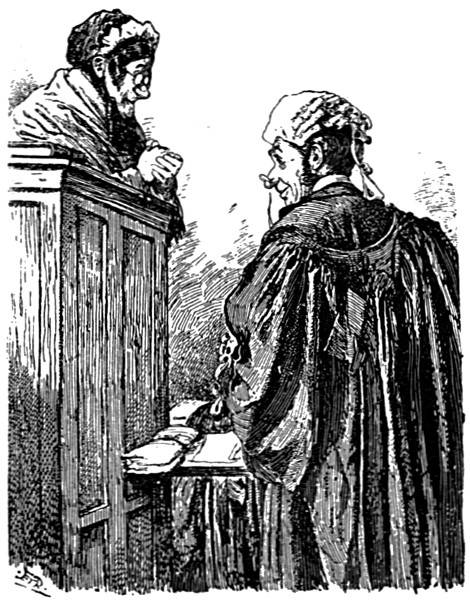
A PROMISING WITNESS!
Scots Counsel (addressing an old woman in a case before Judge and Jury). “Pray, my good woman, do you keep a diary?”
“Naw, sir, I kups a whusky shop!”
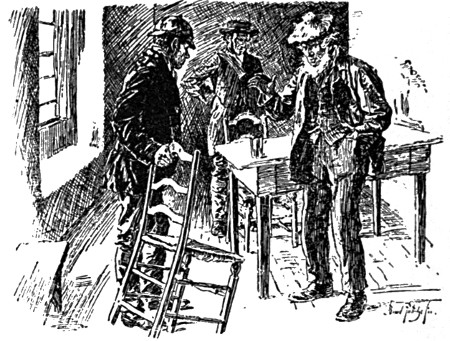
PRECAUTION
Donal’. “A’m sayin’, Tam, what for dae ye tak’ yir dram a’ at a’e mouthfu’?”
Tam (gravely). “Eh, Donal’, man, A ance had ma gless knockit ower!”
Alexander ab Alexandro.—(“It is stated that a Scotsman, at Greenock, is to have the honour of contributing a considerable portion of the machinery for the Suez Canal works.”) A Scotsman, of course. Who should understand the desert but Sandy?
A Scots Aunt who’s always on the Sofa.—Aunty-Macassar.

DISGUISED IN TARTAN
Mossoo has been invited north for a few days’ shooting. He arrives tout à fait—“en Montagnard”!
Charm of a Scots Smoking Concert.—The Pipes.
Succour for Scotsmen.—If a Scotsman were between Scylla and Charybdis, and puzzled as to which he should give the preference, would not his national instinct prompt him at once to take the Siller? and, when once he had got his hand fairly upon it, we do not think he would very quickly leave it again.
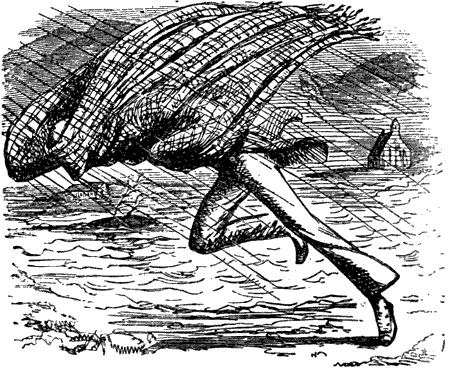
THIS IS THE PROTECTION A PLAID AFFORDS TO THOSE WHO DO NOT KNOW THE WAY TO CARRY IT
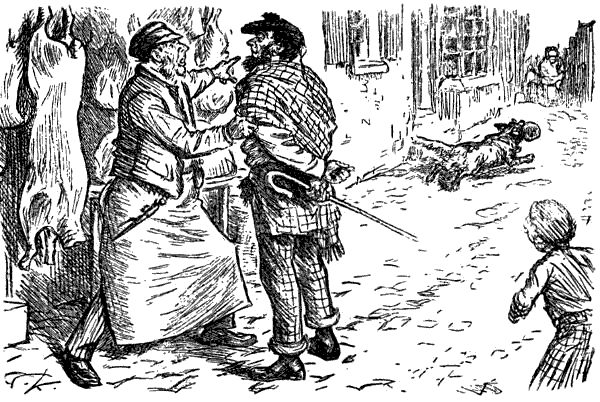
REPUDIATION
Butcher (rushing out). “Hey—ess that yoer doag, mun?”
Donald. “Aweel—he wass mine ance, but he’s aye daein’ for hessel noo!!”
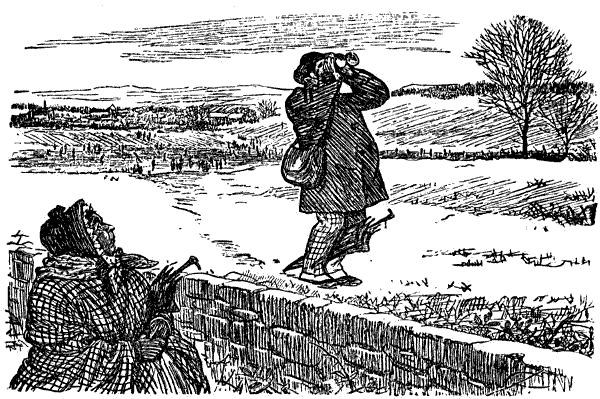
JUDGING BY APPEARANCES
Old Scots Wife. “Losh me! There’s a maun drenkin’ oot o’ twa boattles at ance!!”
[The old gentleman was trying his new binocular, a Christmas present to his nephew.
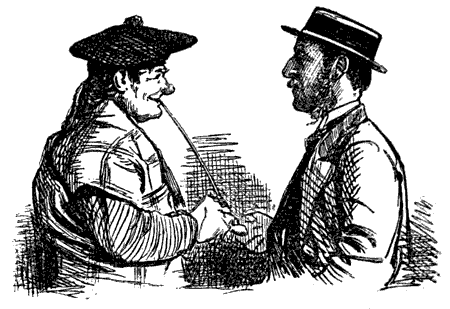
“A NARROW ESCAPE”
(FRAGMENT OVERHEARD THE OTHER DAY)
“Well, Lauchie, how are you?”
“Man, I’m wonderfu’ weel, considerin’.”
“Considerin’—what?”
“I did last nicht what I’ve no dune this thirty year. I gaed to bed pairfutly sober, and I’m thankfu’ to say I got up this mornin’ no a bit the waur.”
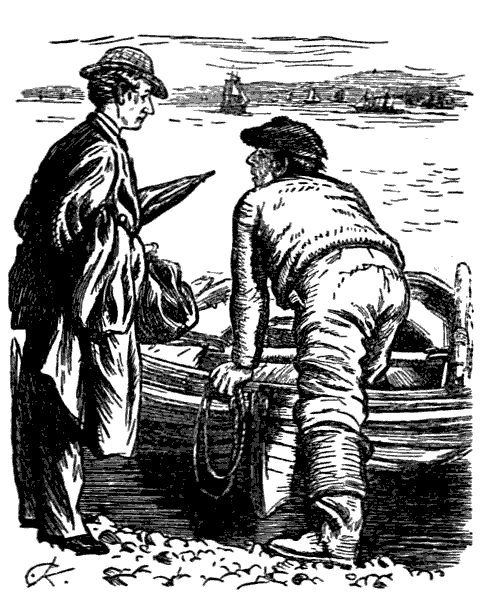
SCRUPLES
English Tourist (having arrived at Greenock on Sunday morning). “My man, what’s your charge for rowing me across the frith?”
Boatman. “Weel, sir, I was jist thinkin’ I canna break the Sawbath-day for no less than f’fteen shull’n’s!!”
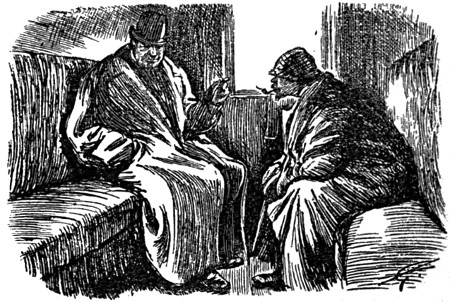
“WHOLESALE”
Scot (to Fellow-Traveller on Northern Railway). “May ah ausk what line ye’re en?”
Our Artist (who had undergone a wide cross-examination with complaisance). “Well—I’m—I’m a painter.”
Scot. “Man, that’s lucky! Ah deal i’ pents—an’ ah can sall ye white leed faur cheaper than ye can buy’t at ony o’ the shoaps.”
Artist. “Oh, but I use very little. A pound or so serves me over a year.”
Scot. “E——h, man! Ye maun be in a vera sma’ way o’ beezeness!!”
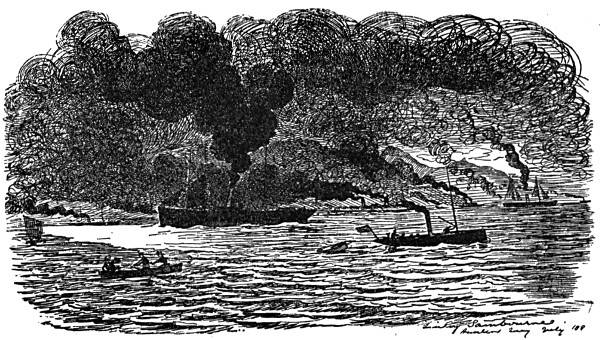
THE CLYDE.—BEAUTIES OF SCOTTISH SCENERY AS SEEN BY OUR ARTIST.
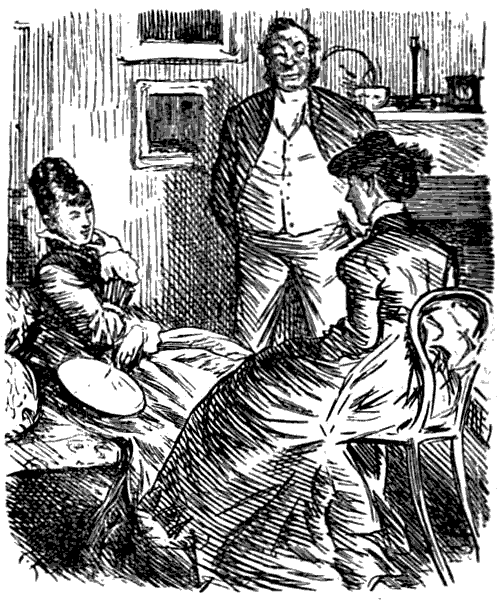
TOO CANDID BY HALF
Visitor (to newly-married friend). “I was admiring your little carriage, Mrs. McLuckie, so——”
Mrs. McLuckie. “Oh, the brougham! Yes; you’ve no idea what a comfort I find it——”
Mr. McLuckie. “Oo aye! It’s gey handy! We’ve jist jobbit the cab for the coorse weather!!”
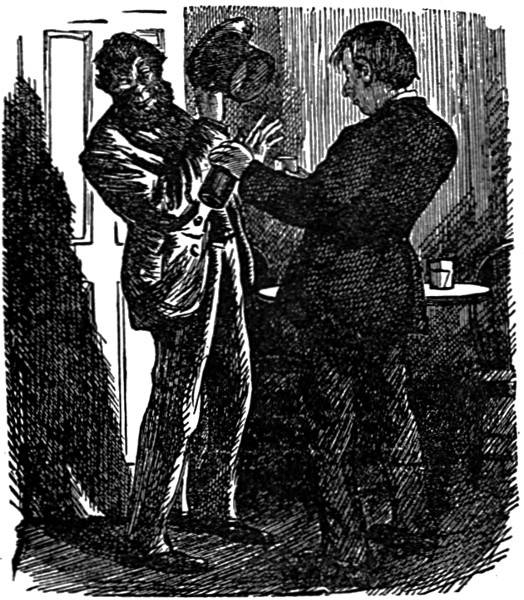
CAUTION
Host. “Just another wee drap ’fore you go——”
Guest. “Na, na, I’ll tak’ nae mair! I’m in a new lodgin’, and I’m no vera weel acquainted wi’ the stair!!”
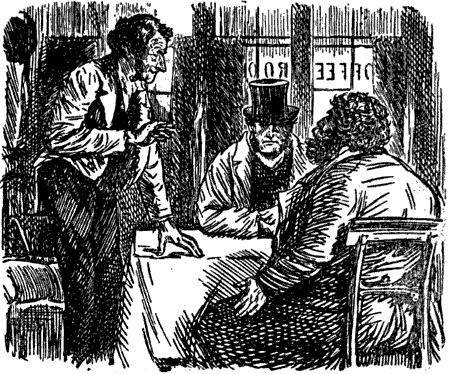
“AULD EDINBRO’”
Saxon Traveller. “This is too bad, waiter! I told you we wanted to go by the 9.30 train, and here’s breakfast not ready!”
Celtic Waiter. “A weel, sir, fac’ is, the cook tak’s a gless!”
Scotland for Ever!—Benjamin Barking Creek (thinking he is going to pull the mighty leg of MacTavish). But you must allow that the national emblem of your country is the thistle.
The MacTavish. And for why? Because we grow it for ye Southrons to eat!
[Exit B. B. C.
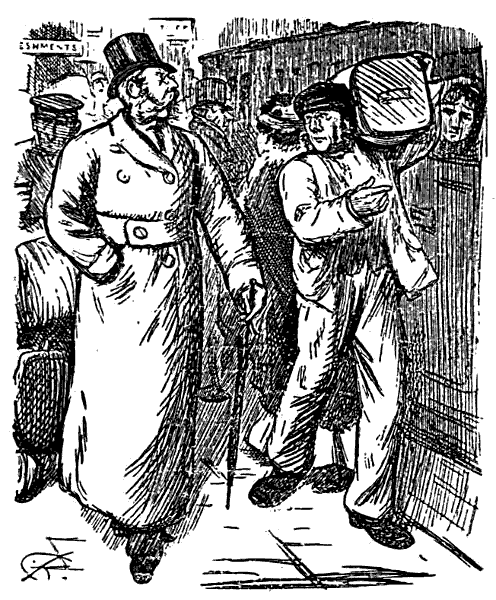
“BENEATH THE LOWEST DEEP”
Swell. “Ah, Port-ar, is this twain—ah—composed entirely of second-class cawwiages?!”
Glasgow Porter. “Na, na, man, there’s a wheen third-cless anes further forrit there!!”
At Redrufus Castle.—The Duchess of Stony Cross (to Mrs. MacShoddy, who is returning a duty call). The Duke has actually consented to be Mayor of Crankborough in succession to poor Mr. Slitt.
Mrs. MacShoddy. Well! that’ll be very nice for you! You’re sure to be invited to the Mansion House in London during the season!
A Scot on Sweet Sounds.—A’ music whatever is o’ Scottish origin an’ derivation. It a’ cam Sooth frae ayont the Tweed. A’ music just resolves itsel’ intil a meexture o’ Tweed-ledum an’ Tweedle-Dee—the Scottish Dee.
The oreeginal St. Cecilia was a Miss MacWhirter. She invented the Bagpipes.
Rejected Medical Advice (by a Scotsman).—“Try your native air.”
In Scotland, it is not permitted even to whistle on the Sunday. My friend, Wagg, tells me, however, that “you must whistle for what you want.” I remark this contradiction. But they are an obstinate race, the Scots.
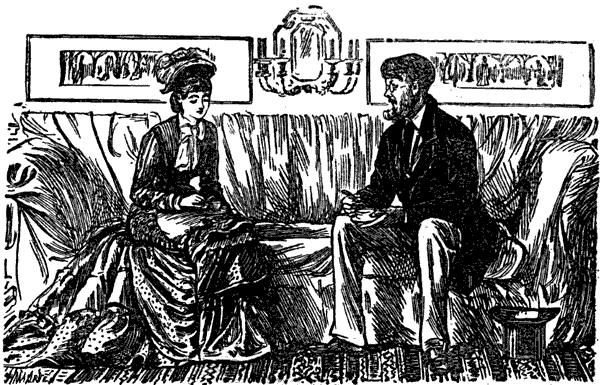
Mrs. Golightly (fishing for a compliment). “Ah! Mr. McJoseph, beauty is the most precious of all gifts for a woman! I’d sooner possess beauty than anything in the world!”
Mr. McJoseph (under the impression that he is making himself very agreeable). “I’m sure, Mrs. Golightly, that any regret you may possibly feel on that score must be amply compensated for by—er—the consciousness of your moral worth, you know,—and of your various mental accomplishments!”
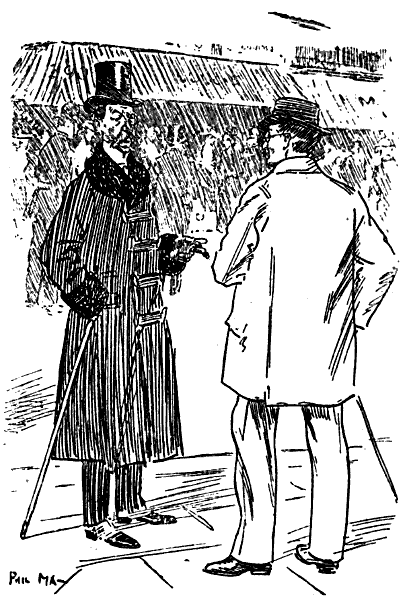
Jink. “My dear MacFuddle, it’s the very thing you want! Charming house—lovely spot! Cheap, too. But one great drawback. You can’t get any water there!”
MacFuddle. “Oh, that doesn’t matter!”
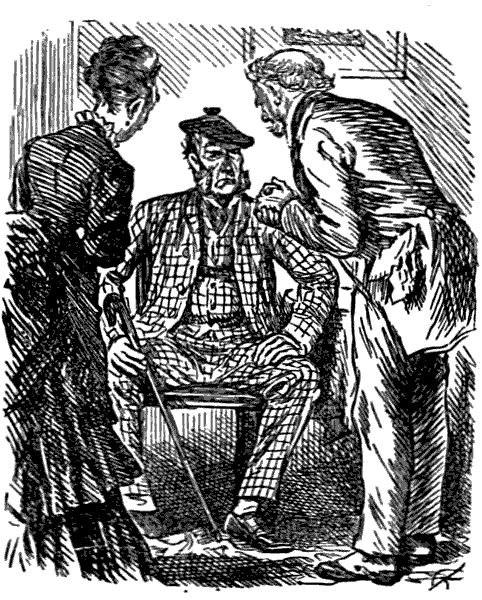
REFRESHMENT
Hospitable Good Templar (to Visitor—average Scotsman). “Well, now, what will you tak’, Mac, after your walk—tea, or coffee, or pease-brose?”!!
[Comment is needless.
[The Scottish Education Department, not satisfied with the pronunciation in vogue beyond the Tweed, has appointed a Liverpool gentleman to instruct the teachers of Scot’and how to speak polite English.]
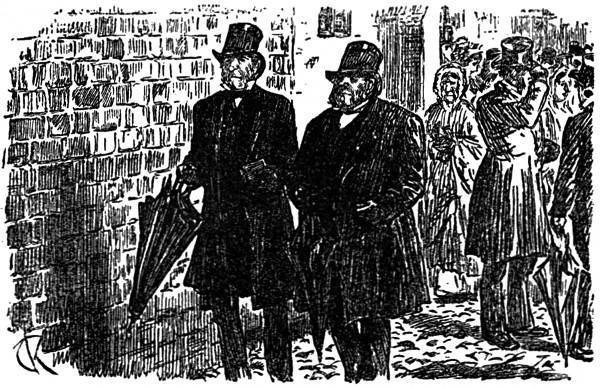
CONSCIENCE
U. P. Elder. “The meenister needna’ ’been that haurd en hes discoorse. Theer plenty o’ leears i’ Peebles forbye me!”
Providing for the Future.—The O’Hooligan (to the MacTavish). Faix! but ye seem to be overlapping your quantum to-night, Laird. Has your grandfather jined to the Kensal Greeners?
The MacTavish. That no, sir, but the morrow, gin that nae accident happen, I shall hae the luxury o’ lunching wi’ my bluid cousin, the ex-Baillie o’ Whilknacraigie, a strict temperance mon, wha canna stand whusky. And so I’m joost drinkin’ up to his soda-water beforehand.
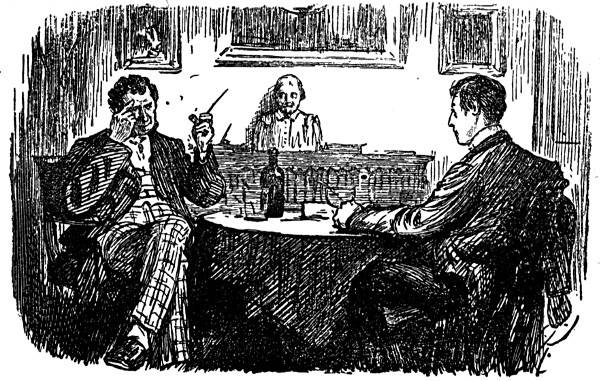
“THE BAR-RD OF A-Y-VON!”
Member of the “Northern Shakspeare Society.” “Man, yon Wully Shakspeare maun hae been a maist extr’o’dinary pairson! Theer-r thengs cam’ entil his heid ’at wad never hae com’ ento mine!—NEVER!”
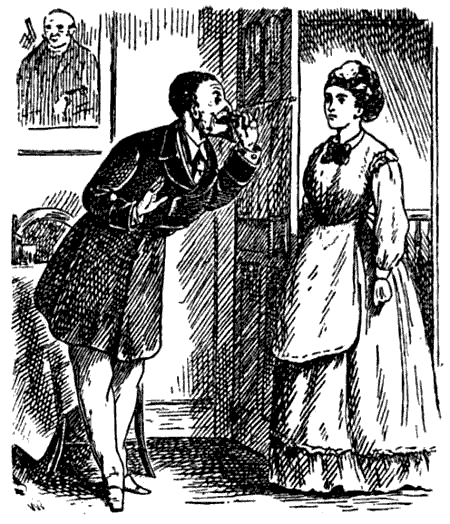
Scottish Waitress. “There’s a laddie doon the stair wa’antin’ tae see ’ye——”
Mossoo. “A lady! Mon Dieu! Say her to give herself the pain to sit down while I arrange my toilet.”
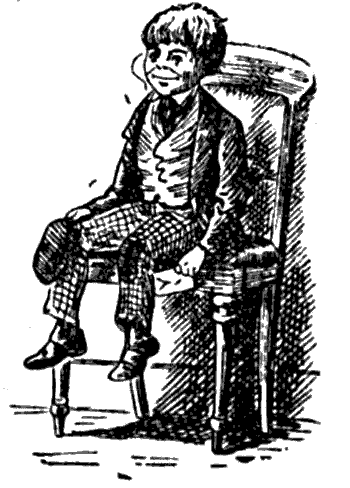
The “lady” in waiting.
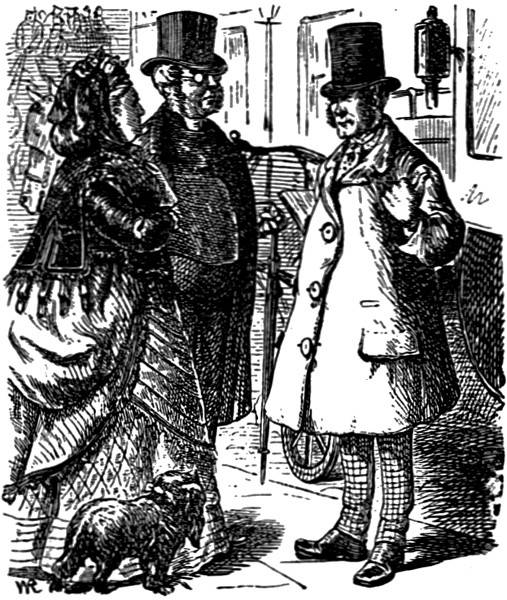
PROMPT AND PRACTICAL
Reverend Stranger. “My good man, can you tell me the nearest way to the cathedral?”
Scottish Cabby. “Jist inside the cab here, sir.”
(Being an additional Chapter to “The Tour in the Hebrides”)
“Sir,” said Dr. Johnson, “let us take a walk down Princes Street.”
Finding the great man in so excellent a humour, I seized upon the opportunity to put to him many interesting questions.
“Sir,” said I, “pray what do you think of Edinburgh?”
“I think, sir,” replied the Doctor, “that its name is most appropriate.”
“Sir,” I continued, in a fever of anticipation, “I shall be very much obliged to you if you will explain your meaning in greater detail.”
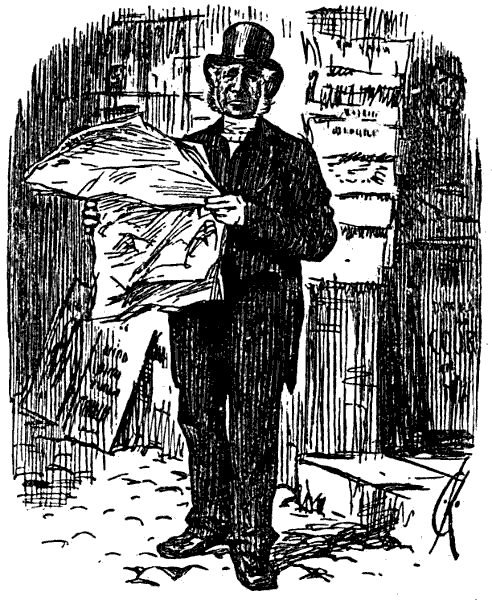
“THE BILLS OF MORTALITY”
Kirk Elder (after a look at his morning paper). “Poor McStagger deid! Et’s vera sad to thenk o’ the great number o’ destengweshed men that’s lately been ta’en! ’Deed—I no feel vera weel—mysel!”
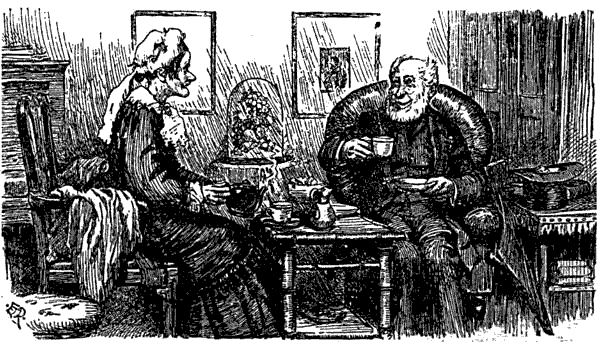
A MERE DETAIL
Friend of the Family. “Weel, Mrs. M‘Glasgie, and how’s your daughter doin’, the one that was married a while ago?”
Mrs. M‘Glasgie. “Oh, varra weel, thank ye, Mr. Brown, varra weel, indeed! She canna abide her man. But then, ye ken, there’s aye a something!!”
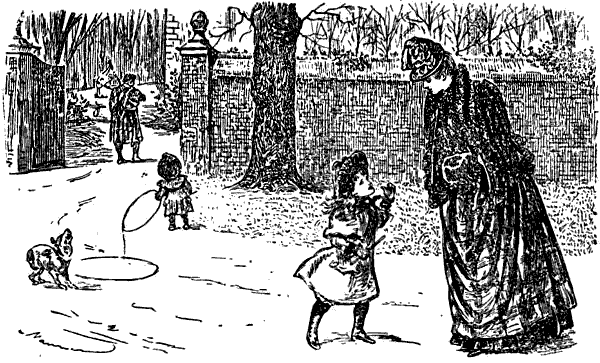
A YOUNG HUMANITARIAN
“Oh, mamma, mamma, couldn’t you interfere? There’s a horrid man squeezing something under his arm, and he is hurting it so!”
Dr. Johnson. Sir, I am sorry that my meaning should require explanation. I say that the name Edinburgh is appropriate, because I find the city primitive and beautiful. Adam and Eve would, doubtless, have held it in high consideration had they had the advantage of its possession. In [50] short, sir, they would have called it the town of their Eden, or Edinburgh.
Mr. Boswell. A pun, sir!
“It was a pun, sir!” cried the Doctor, very angrily, and I hastened to change the subject.
“I am surprised to find, sir,” said I, “that Her Majesty does not reside at Edinburgh. Do you not think, sir, that she might use her Scottish Palace at Christmas time?”
“No, sir, I do not think so,” replied the Doctor, “and I can find no reason for your surprise.”
“Indeed, sir!”
Dr. Johnson. Sir, were Her Most Gracious Majesty to dwell at Edinburgh at Christmas time, she would be put to great inconvenience. Her Most Gracious Majesty exhibits excellent sense in selecting Balmoral for her residence.
Mr. Boswell. Sir, I trust you do not call in question my loyalty to the House of Brunswick?
Dr. Johnson. Sir, I do not; I only question your wisdom.
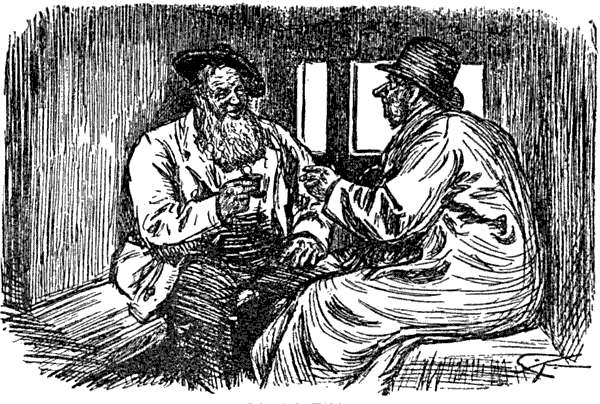
CAPACITY!
First Traveller (proffering his mull). “Tak a pench?”
Second Traveller. “Na, ’m obleeged t’ye—ah dinna tak’t.”
First Traveller. “Man!—that’s a pety!—ye’ve gr-r-raund accaummodation for’t!”
Mr. Boswell. Sir, if I do not trouble you, will [52]you explain to me why Her Majesty should avoid Edinburgh at Christmas time?
Dr. Johnson. Why, sir, the very branches put up in honour of the festive season would treat her with disrespect!
Mr. Boswell. Indeed, sir!
Dr. Johnson. Sir, if Her Most Gracious Majesty visited Edinburgh at Christmas time, would she not find Holly-rood?
Mr. Boswell. Another pun, sir!
“It was another pun, sir!” cried the Doctor, very wrathfully, and I said no more.
The next day we visited Stirling. We walked up to the Castle, and admired the magnificent view we there obtained of the surrounding country. We next examined the ramparts.
“These old walls, sir,” said I, “must weigh many thousand tons avoirdupois.”
“Sir,” replied the Doctor, “you should have said pounds Stirling!”
“Another pun, sir!” I exclaimed.
“It was another pun, sir!” roared the Doctor, and I thought it best to hold my peace.
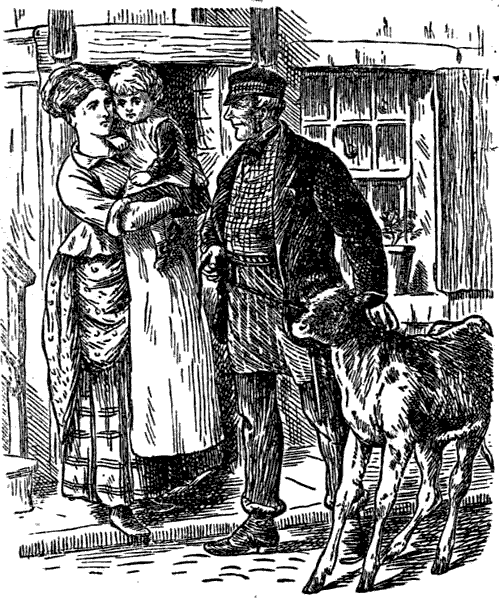
DE MORTUIS
Sympathetic Young Mother. “I wunner ye could be sae cruel as to kill that bonnie wee cauf!”
Practical Butcher. “Weel, ye see, ye’ll no eat them leevin’!”
The next morning found us at Perth. Here we [54]were received most hospitably by the gentry and the people. In the company of our host (a gentleman of the highest consideration in “The Fair City”), we ascended Kinnoul Hill, and greatly admired the splendid scenery.
“A very lovely spot, sir,” I ventured to observe.
Dr. Johnson. Sir, you are right. Sir, I have here found the people so kind-hearted, the city so handsome, and the scenery so magnificent, that I confess it would give me infinite satisfaction were I able to call the town in which I was born the place (as the Highlanders have it) of my Perth!
“A pun, sir!” exclaimed our excellent host, and I could not help noticing that he seemed greatly surprised.
The Doctor made no reply, but I could see by the working of his countenance that he was suffering pain.
We came to our journey’s end at Wick.
“What do you think of this place, sir,” I asked.
Dr. Johnson. Sir, I think that the title of “The Modern Athens” should be conferred upon Wick rather than upon Edinburgh.
Mr. Boswell. Indeed, sir! May I ask why?
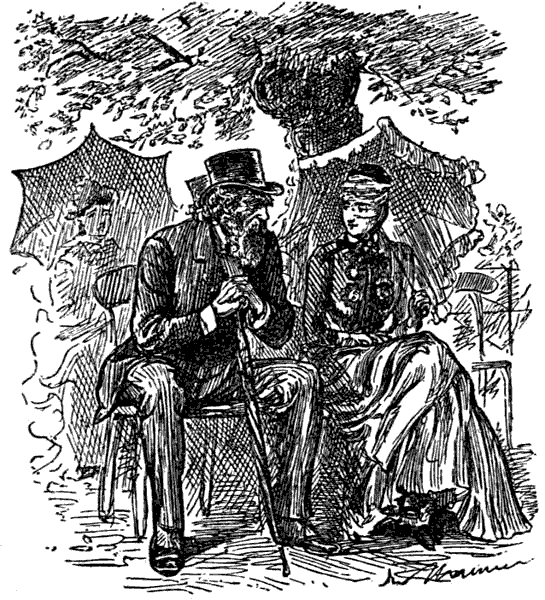
Q. E. D.
Professor McPhairrson. “No, Mrs. Brown, it’s not that we Scots are dull; but you English see a joke in anything! Why, the other day I was in a room with four Englishmen, one of whom told a story, and, would you believe it, I was the only man that didn’t laugh!”
Dr. Johnson. Why, sir? Sir, you must be very dull. I say, sir, that Wick should be called “The Modern Athens.”
Mr. Boswell. I confess, sir, that I am dull, and yet I cannot perceive why Wick should be called “The Modern Athens” rather than Edinburgh.
Dr. Johnson. Sir, you indeed must be dull if you do not associate Wick with the centre of Greece!
I was silent for a few minutes, and then I ventured to make a remark.
“Sir,” said I, “you once expressed a very strong opinion about pun-makers. Sir, you asserted your belief that a man who would make a pun would be capable of picking a pocket.”
Dr. Johnson. Sir, I believe so still.
Mr. Boswell. And yet, sir, during the course of our tour, you have made a large number of puns.
Dr. Johnson. Sir, you have good grounds for what you assert. I admit, sir, with a feeling of sorrow, that I have made many puns during our tour.
Mr. Boswell. Sir, may I venture to ask you why you have made so many puns?
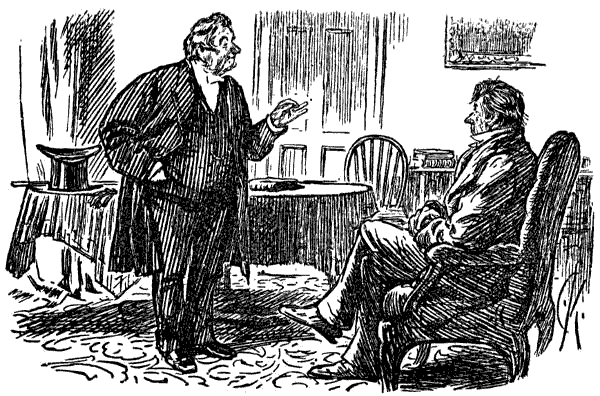
“DIRECTIONS”
Scottish Village Practitioner (to Northern Farmer). “Eff the Lunnon doacter”—(his patient had been south to consult a great specialist)—“’ll no allow ye whusky, an’ ye can tak’ nowt but reed wine, theer just twa ’ll dae ye ony guid—an’ ye’ll mind o’ them, for they’re baith monoseelawbic!—po-or-r-t an’ clair-r-t!!”
“Sir,” said Dr. Johnson, “the puns you have noticed are symptoms of a painful disease, known to men of letters as ‘the Silly Fever.’ I attribute the commencement of this melancholy malady to the depressing effects of a Scottish climate upon a Londoner in September!”
The best Scottish Joke we ever heard.—A clever Scotsman being told that Demosthenes was in the habit of making speeches at the seaside with small stones in his mouth, exclaimed, “Hoot, mon! then he must ha’ been the first Member for Peebles.” (Loud cries of “Apology,” which not being given, the Reader proceeds to groan.)
The Tartan Epidemic.—The MacTavish (very angrily, to the new Boots at the “Rising Sun.”)—Where, by St. Andrew! have ye planted my braw new kilt that I put oot, for to be decently brushed! Green, red, black and white plaid.
Boots (after search).—I beg pardon, sir, but the chambermaid mistook it for the skirt of the young lady in No. 13. But you’ve got her gown!
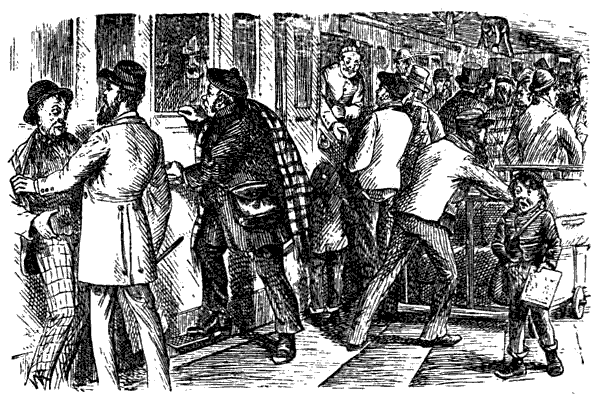
RECOLLECTIONS OF THE HOLIDAYS
Fussy Body (in search of a seat). “A’ fu’ here?”
Voice from the depths.
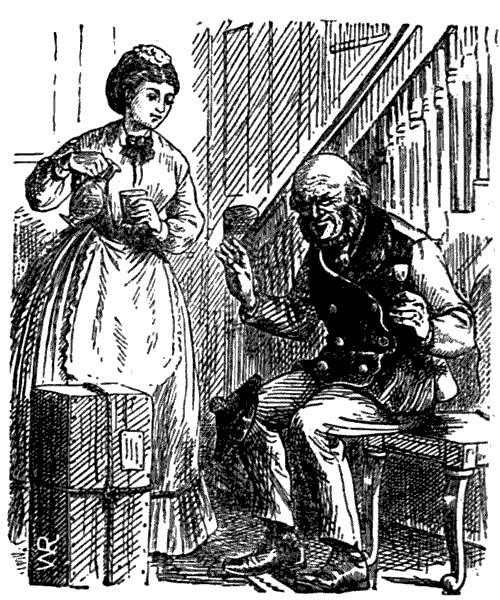
A WILLING MARTYR
Scottish Carrier. “Eh, bit that’s strong whusky! Bit! U’ll no spile the taste wi’ water. U’ll rather thole’t!”
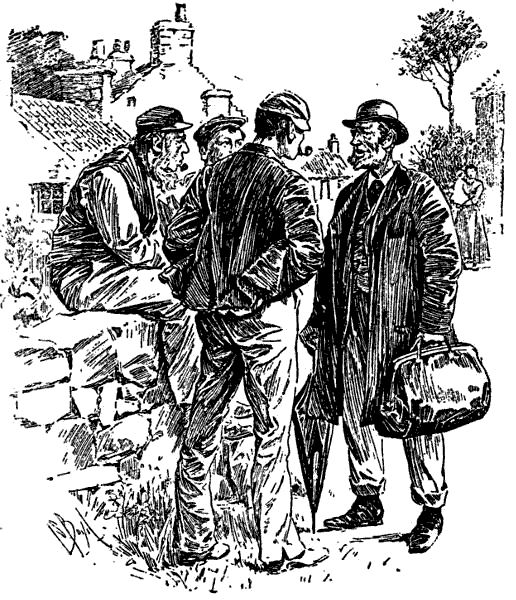
THE RETURN OF THE NATIVE
Tam. “Sae ye’ve gotten back, Sanders?”
Sanders. “’Deed, aye. I’ve just gotten back.”
Jamie. “An’ hoo did ’e like London?”
Sanders. “Od, it’s an ootlandish place yon! They tell’t me they couldna unnerstaun ma awccent!”
John. “Awccent! I never heard tell that Fife folk had ony awccent!”
[1] A little pickle.
[2] Sporting like a kitten.
[3] The Lowland language has no equivalent for this word, which in itself is so peculiarly expressive.
[4] Whispers soft things.
[5] Sitting.
[6] Arm round my waist.
[7] Four lips.
[8] Jaunty.
[9] Go away.
[10] Remain.
[11] Hieland proverb signifying that enough for one is not sufficient for two.
[12] Sleep.
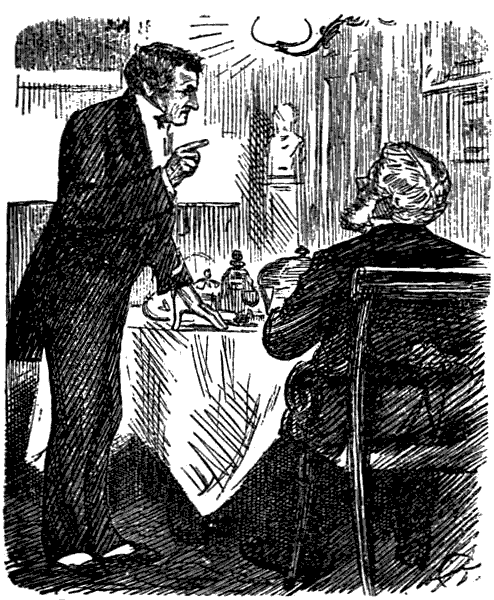
SAWBATH RECREATION
Gentleman from N. B. (he had sent his Presbyterian butler to a service at Westminster Abbey). “Well, Dugald, what did you think of it?”
Dugald. “Aweel, sir, it was mair like heev’n than airth; but e—h, sir, it’s just an awfu’ way o’ spennin’ the Sawbath, yon!!”
The Irishman in Scotland.—Sorr, there is a river that requires milk an’ sugar before ye’d dhrink a dhrop of it? What is it? Sure ’tis the river Tay.
A Conundrum made by a Little Boy only Seven Years Old.—Why is an umbrella like a Scottish shower?—Because the moment it rains it’s missed.
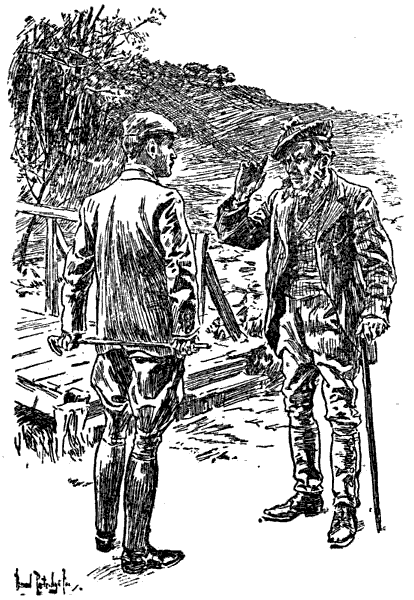
Scene—A Scottish Estate. The New Heir has run down to see the property.
The Heir. “I sha’n’t be able to come and settle here just yet, McTavish, as I’m ordered out to South Africa, but——”
McTavish (his Factor—with feeling). “A’m sorry,—A’m varra sorry to hear that”—(the Heir is rather touched)—“because ye’ll understan’, if onything was to happen to ye, A doot the estate couldna stan’ two succession duties so close.”
(A Comparison)
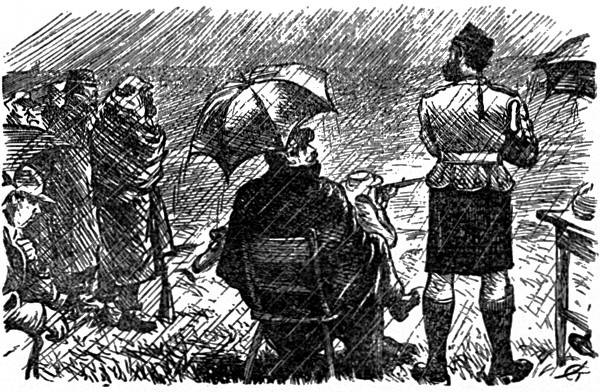
“USED TO IT!”
Officer at firing-point (who thinks that it’s raining). “Sergeant Mauchline, hadn’t you better wear your great coat till it’s your turn to fire?”
Sergeant Mauchline (frae the “Land of Lorne”). “Hoo! No the noo! I’ll pit it on when it comes wat!”
City Friend (visiting in Scottish rural town). And tell me, Andrew, are you wi’ the Wee Kirkers, or the United Frees?
Andrew. Man, I’m gi’en’ up releegion a’thegither, an j’inin’ the Auld Kirk.
The Scotsman who tumbled off a bicycle says that in future he intends to “let wheel alone.”
My Only “Crossed Checks.”—My own Shepherd’s-plaid Trousers.
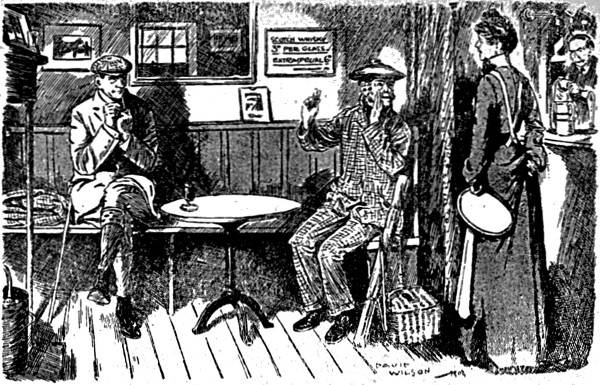
QUANTITY, NOT QUALITY
English Angler, having discovered there are two sorts of whisky at the inn (best at 6d., second best at 3d.), orders a glass each of the sixpenny.
Gillie (in a whisper to the maid as she passes). “Make mine twa o’ the threepenny!”
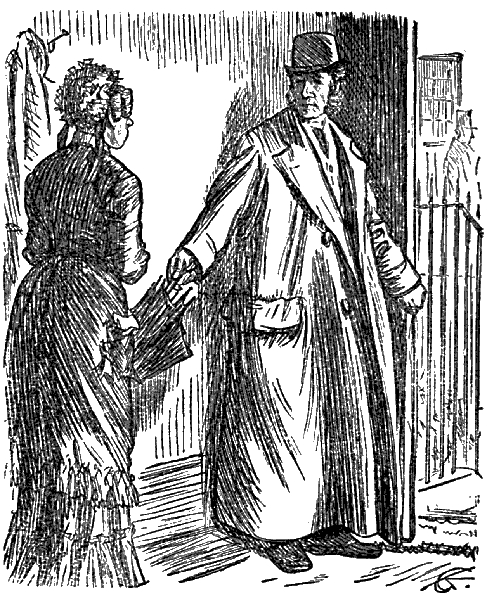
A PRACTICAL APPLICATION
Irate Landlord (and Free-Kirk Elder, after being called in, for the fiftieth time, about some repairs). “The fact is, Mrs. McRacket, ye’ll ne’er be content till ye’re i’ the hoose made wi’out hands.”—(Severely.)—“See Second Corinthians, fifth chapter, and firrst vairse, Mrs. McRacket!”
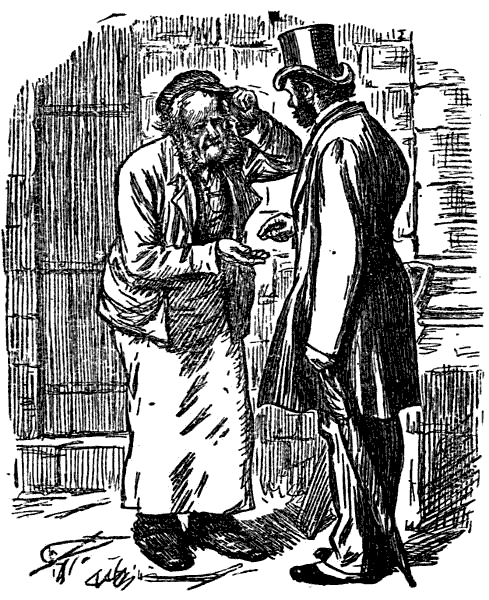
“DEPRESSION”
Tourist (tipping the old gravedigger, who had shown him over the Cathedral). “I suppose, now so many visitors are in the town, you’ll be doing well?”
Gravedigger. “Ou aye, there’s a wheen fowk gaun aboot, but”—(gloomily)—“there’s terr’ble little deein’ in the diggin’ waye!”
Since the immortal meeting of the Brick Lane Temperance Society, at which the Messrs. Weller and the Reverend the Shepherd attended (after refection elsewhere), and the latter, in response to the Chairman’s fat smile and invitation to address the meeting, declined, on the ground that the meeting was drunk, we have seen nothing so good as this, which we take from the Dundee Courier:—
“On Sunday last, the minister of a large congregation in Dundee was interrupted in the course of his forenoon sermon by the repeated coughing of his auditors. Pausing in the midst of his observations, he addressed his congregation to the following effect:—‘You go about the streets at the New Year time—you get drunk, and get cold, then you come here and cough, cough like a park of artillery. I think I must give you a vacation of six weeks, that you may have time to get sober, and to regain your health again.’”
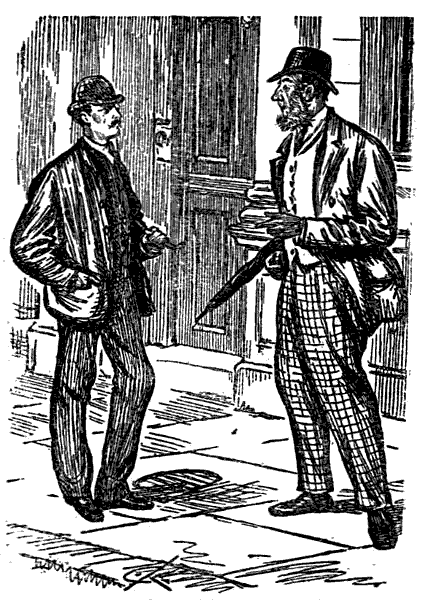
“MOST UNFORTUNATE!”
Bailie McScrew (to Smith, on a short visit to the North). “An’ what are ye daen’ to-morrow nicht, Mester Smeth?”
Smith. “To-morrow? Oh, nothing particular.”
Bailie. “An’ the next nicht?”
Smith. “Ah! on Friday I’m to dine with the Browns——”
Bailie. “Man, that’s a petty! Aw was gaun t’ ask ye to tak’ yer denner wi’ us o’ Friday!!”
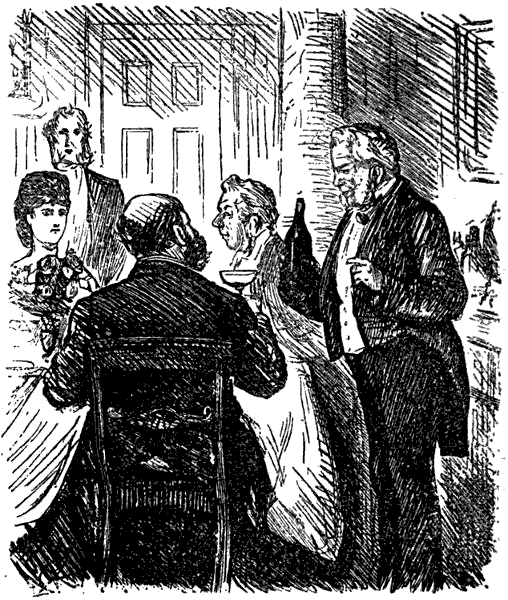
IN VINO MEMORIA
Major Portsoken (a pretty constant guest). “I say, Buchanan, this isn’t—(another sip)—the same champagne——!”
Scots Butler. “Na, that’s a’ dune! There was thrutty dizzen; and ye’ve had yere share o’t, major!!”
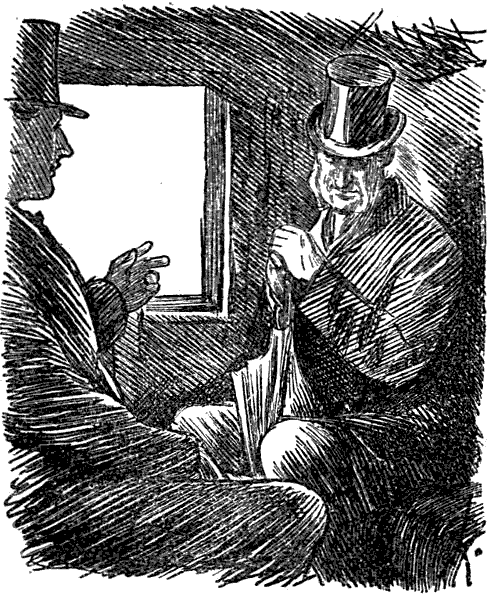
TITLES TO DISTINCTION
Passenger (from the South, waking up). “Pray, sir, what station is this?”
Native. “Thes es Paisley, sir!—Paisley! Celebrated toon, sir!—Berrth-place o’ th’ poat Tannahul, sir! And—’hem?—ah’m a Paisley man mysel’, sir! Ah was born i’ Paisley—ah was——”
[Luckily the train had now run into the station, and stopped.
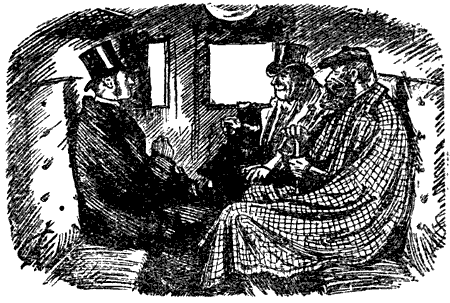
A PRACTICAL VIEW
First Parishioner (to recently-appointed Minister). “Verra gled to fall in wi’ ye, sir, an’ mak’ yer acqua’ntance! I hinna been at the kirk syne ye cam’, as I wis in Ross-shire.”
Parson. “Well, I am very pleased to meet you. You may have heard whether my serm——”
Parishioner. “Oh, a’ the fowk are greatly taken wi’ yer menners an’ appearance, yer attention to the puir bodies o’ the parish, yer visitin’ the sick, an’——wha cares for preachin’!”
This lenitive application did good, for the congregation sat quiet, and coughed no more than they would have dared to do had they been in presence of the Queen, or any other great person, instead of being in a mere church. But one seat-holder, though he held his seat, could not hold his tongue, and declared that the congregation was insulted. We suspect that the minister knew best. In fact, had the incident occurred anywhere but in Scotland, where every man is proverbially sober, we should have been sure that the minister knew best. Hurrah, for the toddy of Bonnie Dundee!
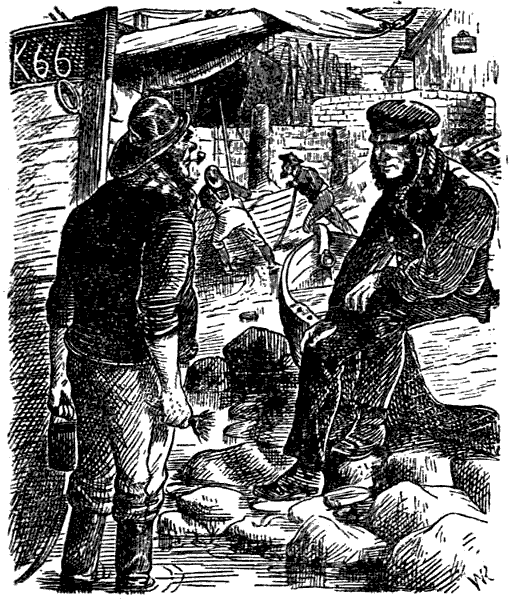
COMMERCIAL INSTINCT
Dugald. “Did ye hear that Sawney McNab was ta’en up for stealin’ a coo?”
Donald. “Hoot, toot, the stipit bodie! Could he no bocht it an’ no paid for’t?”
(An enamoured Southron endeavours to address a Highland Damsel in her own tongue)
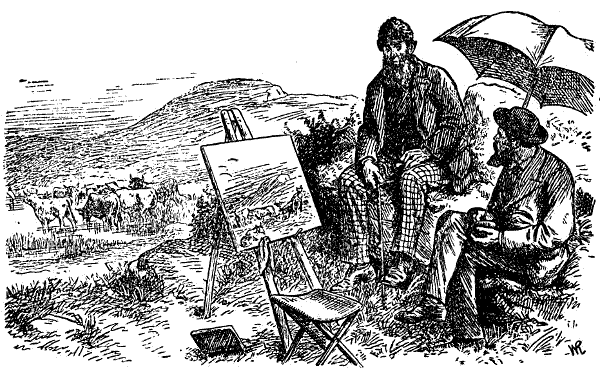
NOT TO BE MADE A FOOL OF
Farmer. “Noo, if it’s a fair question, hoo much wull ye get for thae kye when ye’ve feenished them?”
Artist. “Oh, perhaps sixty guineas, or so.”
Farmer. “Wha-a-t! Dinna tell me, man; A’l no get that for them leevin’.”
At Bonnie Blinkie Castle.—Mr. Lysander B. Chunks, of Chicago (who has rented the property of the Duke of B. B.). I see this mansion described in the guide-books as “palatial.” Why, it isn’t in it with the Mastodon Hotel, Milwaukee!
English Guest. Then why didn’t you hire the hotel?
Macbeth to Bad Mock Turtle.—“Unreal mockery, hence!”
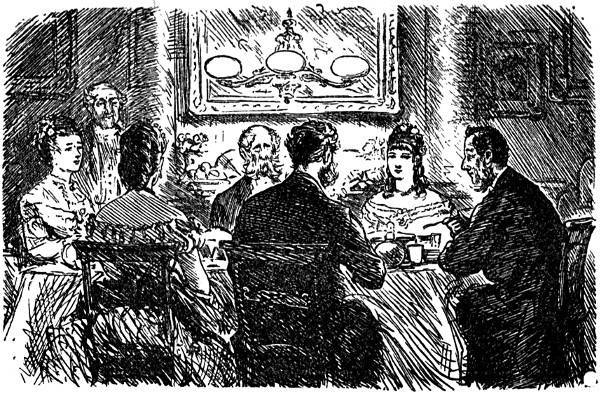
INCORRIGIBLE!
Mrs. M‘Finnan (very genteel, and speaks pure Edinburgh English). “My dear, you’ve got pigeon-pie there, I think.”
Mr. M‘Finnan (an Aberdonian, and not particular). “A——ye. Fa-a’s for doo tair-rt? I’m for neen mysel’!”
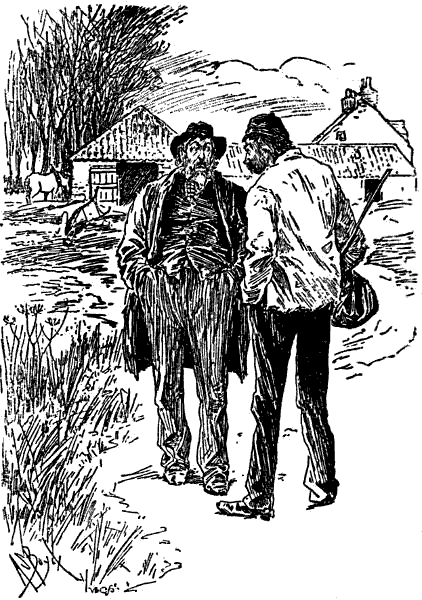
A FRIENDLY WARNING
First Tramp. “I wadna advise ye tae gang up there!”
Second Tramp. “What wye? Is there a muckle doug?”
First Tramp. “No; but there’s a danger o’ wark!”
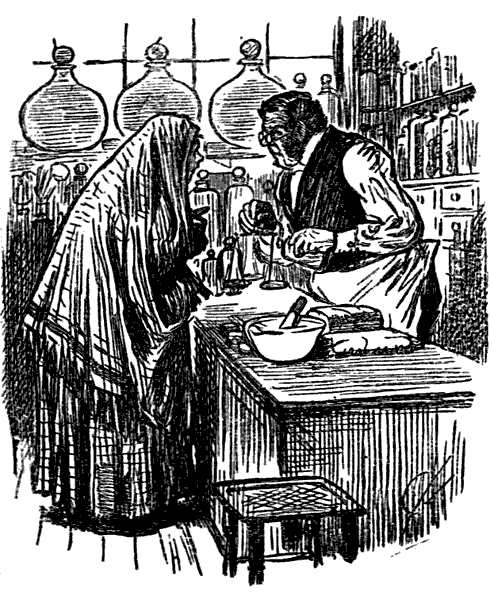
“AGAINST THE GRAIN”
Widow Woman (to Chemist, who was weighing a grain of calomel in dispensing a prescription for her sick child). “Man, ye needna’ be sae scrimpy wi’t—’tis for a puir fatherless bairn!”
[“A ‘Sober Scot Society’ has been formed in Edinburgh. Its members bind themselves not to drink liquor before noon.”—Daily Paper.]
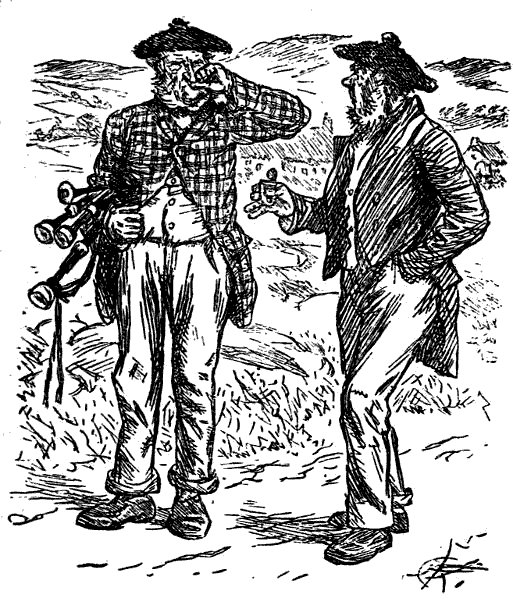
STERN PULPIT-CRITICS
First Scot. “Fat sort o’ minister hae ye gotten, Geordie?”
Second Ditto. “Oh, weel, he’s no muckle worth. We seldom get a glint o’ him. Sax days o’ th’ week he’s envees’ble, and on the seventh he’s encomprehens’ble!!”
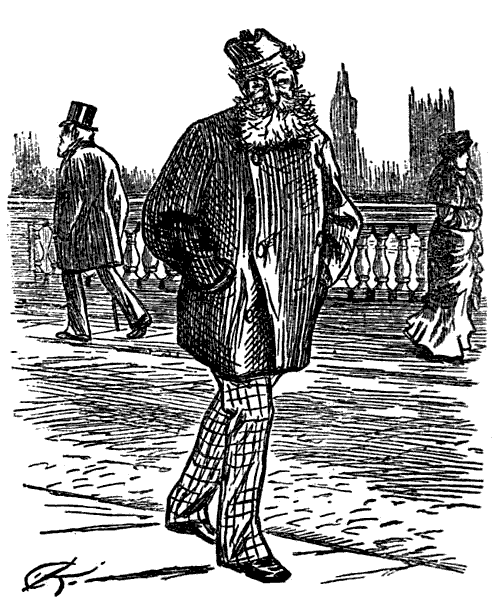
“GOOD INTENTIONS”
Scot (on Waterloo Bridge). “Hech! To think I save a bawbee every time I cross this bonny brig! I’ll just pit it in the plate the next time I gang t’ the kirk!”
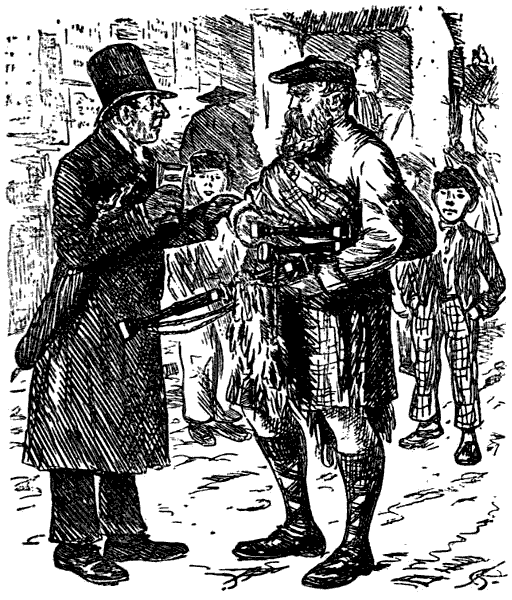
CATECHISM UNDER DIFFICULTIES
Free Kirk Elder (preparatory to presenting a tract). “My friend, do you know the chief end of man?”
Piper (innocently). “Na, I dinna mind the chune! Can ye no whustle it?”!!
Companion Sign to the “Welsh Harp.”—The “Scots Fiddle.”
Wut at Wimbledon.—A Scots volunteer, one of the knot of critics round the firing-point where the line-prizes were being shot for, on asking, with some contempt in his voice, “Whaur thae lads come frae?” and being told “Aldershot,” was heard to mutter, complacently. “Hech, sirs! Aulder shots sud be better shots I’m thinkin’!”
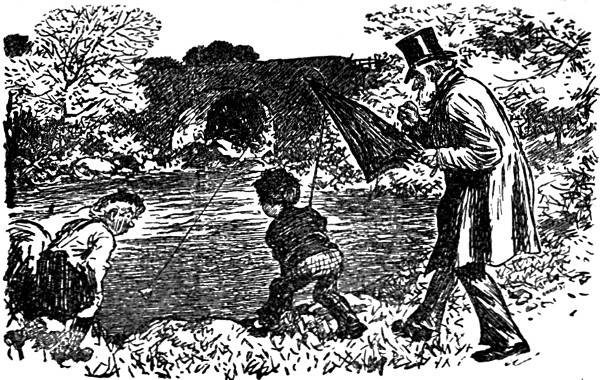
“The Old Adam.”—The Minister (coming on them unawares). “E-e-h! Sandy McDougal! Ah’m sorry to see this! And you too, Wully! Fishin’ o’ the Sawbath! Ah thoucht ah’d enstellet better prenciples——” (A Rise.) “E-e-eh! Wully, man!—ye hae’m!—it’s entil’m! Haud up yer r-rod, man—or ye’ll lose’m—tak’ car-r-re!——”
[Recollects himself, and walks off.
(A long way after Robbie Burns)
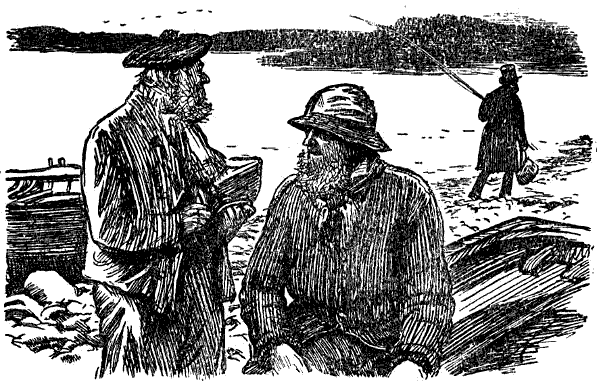
A WARNING TO LAWSONITES
First Scots Boatman. “Weel, Geordie, hoo got ye on the day?”
Second Ditto (drouthy, he had been out with a Free Kirk Minister, a strict abstainer). “Nae ava. The auld carle had nae whusky, sae I took him whaur there was nae fush!”
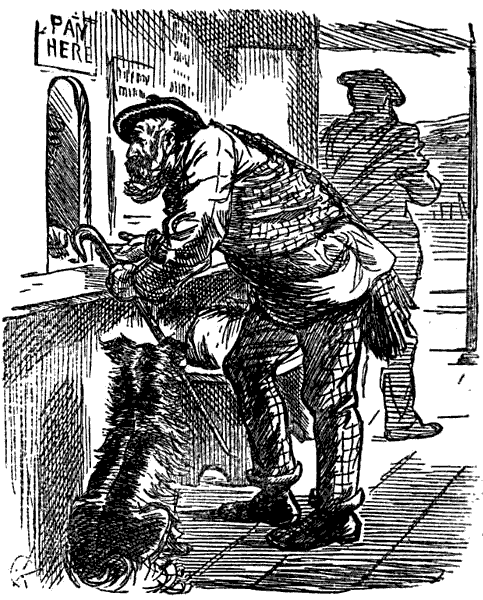
DRIVING A BARGAIN
Economical Drover. “A teeck’t tae Faa’kirk.”
Polite Clerk. “Five-and-ninepence, please.”
Drover. “Ah’ll gie ye five shillings!”
Clerk (astonished).. “Eh!”
Drover. “Weel, ah’ll gie ye five-an’-thrippence, an’ deil a bawbee mair! Is’t a bargain?!”
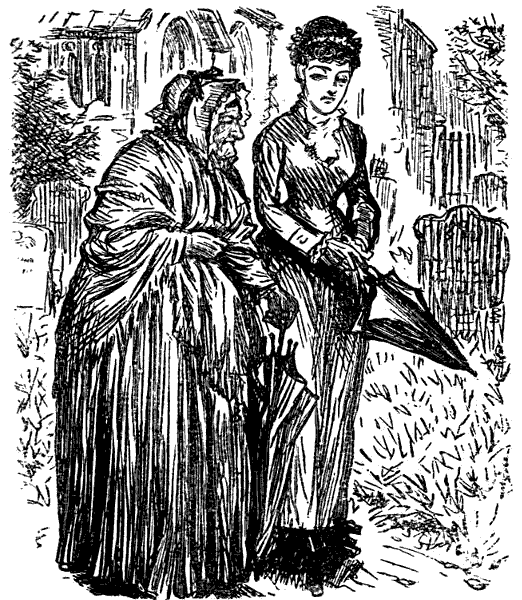
UNCOMPROMISING
The Doctor’s Daughter. “I declare you’re a dreadful fanatic, Mrs. McCizzom. I do believe you think nobody will be saved but you and your minister!”
Old Lady. “Aweel, my dear, ah whiles hae ma doobts aboot the meenister!”
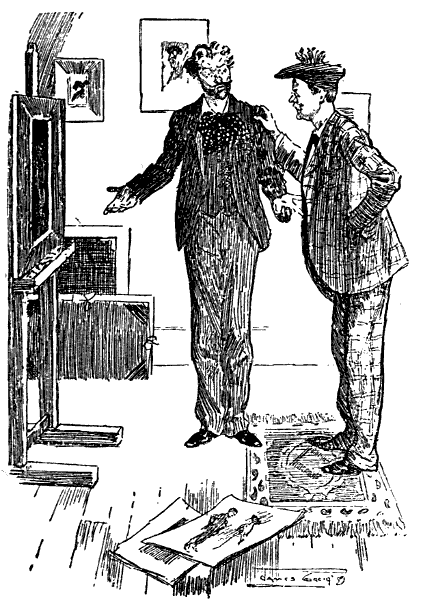
QUOI?
First Artist (six months in Paris).. “Yes, this is the best thing I’ve done.”
Second Artist (just arrived).. “Mon, dinna let that discoorage ye!”
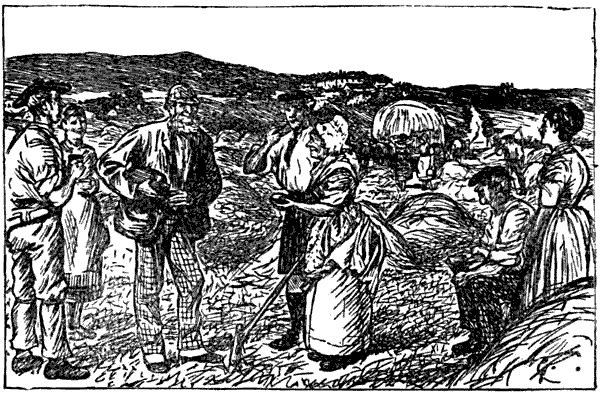
“WHERE THERE’S A WILL THERE’S A WAY”
(Liberal Scots Farmer giving his workpeople a dram). “Awm sorry, Mrs. McDougal, ye canna tak a gless on account of your temperance principles!”
Mrs. McDougal. “Hoot, man! Ye jist poor’t on ma bap, [A] an’ I’ll eat it!”
[A] “Bap,” a roll.
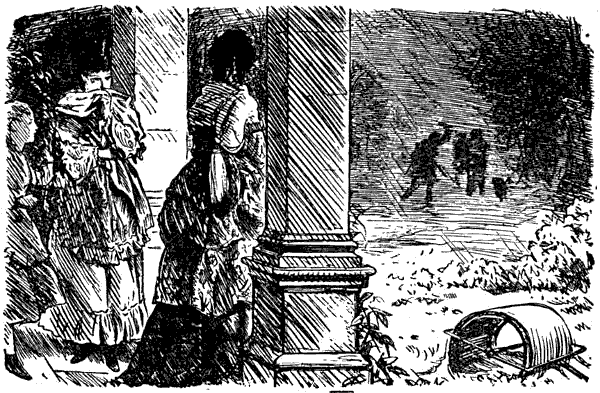
Emily the Elder. “I can’t think why William wanted to take Archie out rabbit-shooting in such horrid weather.”—(Cousin Archie, who is evidently smitten in this quarter, waves an adieu with his bonnet.)—“A regular Scotch mist, I declare!”
Maria the Younger. “Yes, dear, and”—(mischievously)—“somebody doesn’t like missing a Scotsman!!”
[Emily goes in with a toss of her head, and plays “Tullochgorum” furiously on the piano.
At a West-end Club.—Hospitable Southerner (to Scottish guest). Have another go of whisky?
Scottish Guest (with a sigh). I thank ye. No.
Hospitable Southerner (astonished). What! Why surely it’s not a case of “the wee drappie i’ the ee”?
Scottish Guest. Nae, mon, it’s no that; it’s the wee drappee i’ the glass.
[H. S. takes hint and orders a tumbler of whisky.
A Real Scottish Joke.—What’s the next wine to golden sherry? Sillery. (Siller—eh?)
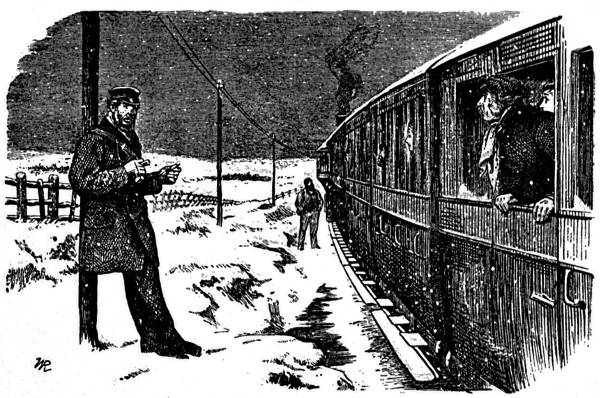
PLEASANT!
Scene—A bleak Scottish moor. Time—New Year’s Day. Train gradually stops.
Excited Passenger. “Now, then, guard, what are you stopping here for?”
Philosophical Guard. “Fact is, the watter’s gane aff the bile. Hooever, it’s jist possible th’ express behin’ll be late.”
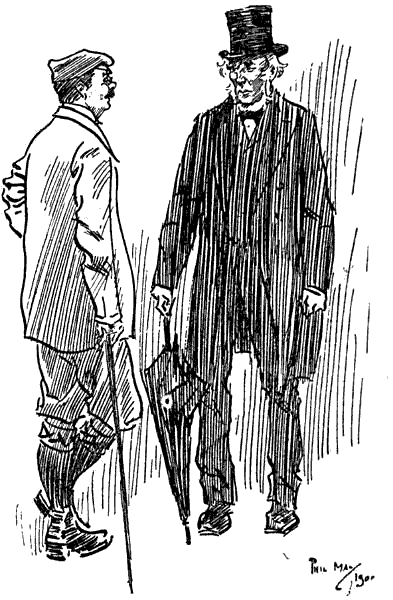
MacAlister. “When ye come tae Scotland I’ll gie ye plenty fushin’ and shuitin’.”
Brown. “Are you fond of fishing and shooting?”
MacAlister. “Na! na! A canna fush and am faird tae shuit!”
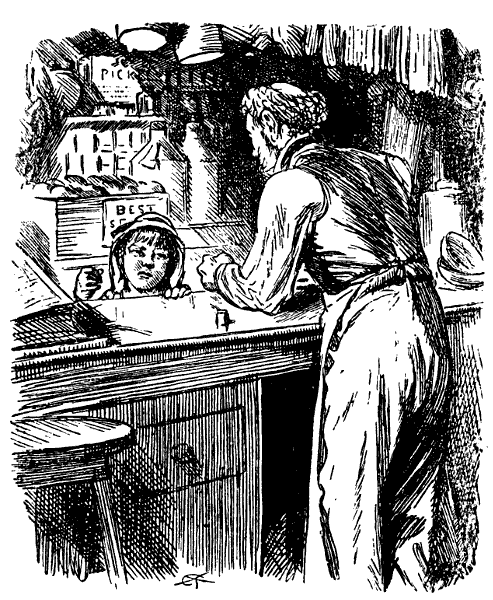
THE RULING PASSION
Little Girl. “Wull ye gie’s ha’pennies for this thripenny, for ma granny’s feared it’s no a gude ane?”
Mr. Briggs loquitur:
Sandy loquitur:
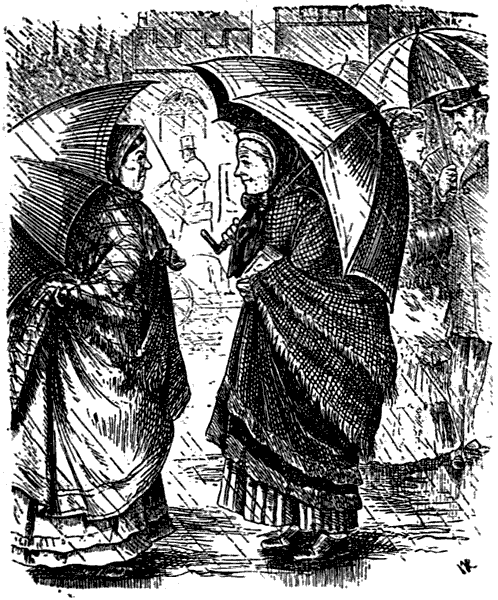
First Lady. “Losh, but the doctor was gran’ the day!”
Second Lady. “H’m! D’ye think he is as clever as he used tae be?”
First Lady (astonished). “Clever!—he’s faur cleverer, but we dinna un’erstan’ him noo!”
“In Vino Veritas.”—Sandie Mac Sawnie respondeth: “Truth in wine, indeed! Hoot, mon, there’s nae sic a thing. Just skake up that auld port, and ye’ll find there’s muckle lees in it!”
At the Board-School Lecture.—Professor McCrobe. And now, where do you suppose germs are originated?
Oversmart Lad (promptly). In Germany, sir!
[Laughter, cheers and—tears.
After a Trip to London.—Archie. Weel, Sandy, an’ hoo did ye pass the time in Lunnon?
Sandy. Richt brawly, mon. An’ forbye, when I’d clappit a stove pipe on my head and put on a frockit coat, ’deed, Archie, if there was a Southron but didna’ take me for a Cockney born and bred!
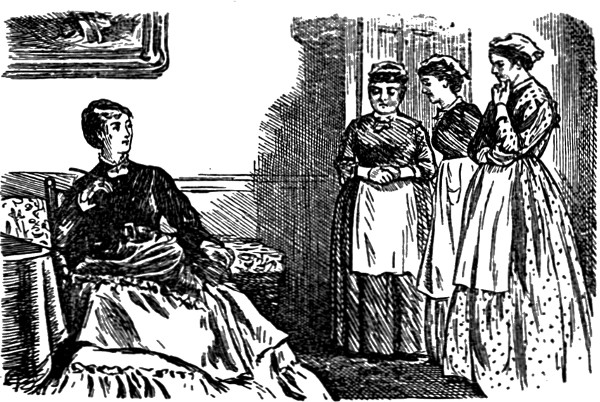
WOMAN’S RIGHTS
Scots Lady (who has taken a house in the Highlands, her servants suddenly giving “warning”). “What’s the reason of this? Have you not all you want?—good rooms, and good fresh air and food, and easy work?”
Spokeswoman. “Yes, mem—but—but there’s no a decent laad within cry o’ us!”
(By The MacPry)
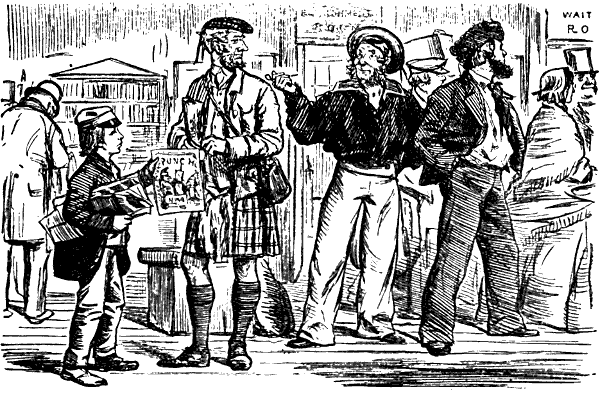
Mariner. “Yo hoy, Bill, stand by! We’ll find a ’bacco shop alongside. Here’s the Scotsman!”
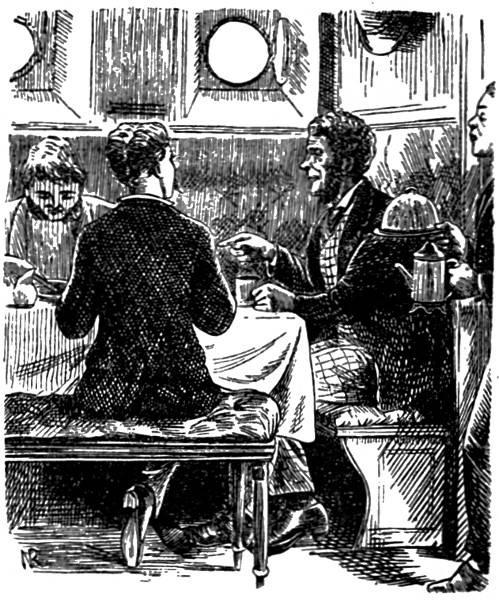
“IS IT GREEK?”
Foreigner. “’Say, mun, rax me owre the pourrie.”
Southerner. “I’m sorry—Je ne parle no French.”
Foreigner. “O, I beg ye’re paurdon—han’ me the cream-jug.”
[No—it is Scotch.
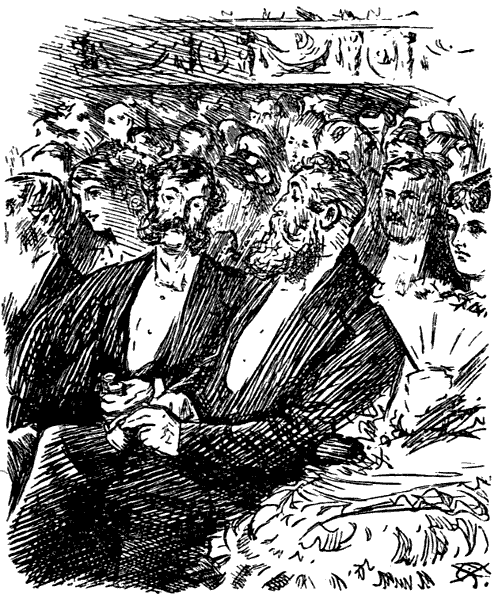
EXPENSIVE!
Londoner (to Friend from the North). “Well, how do you like the opera, MacAlister?”
Mr. MacAlister. “No that bad. But is’t no dreadfu’, man, to be sittin’ in thae chairs at ten shullins apiece!”
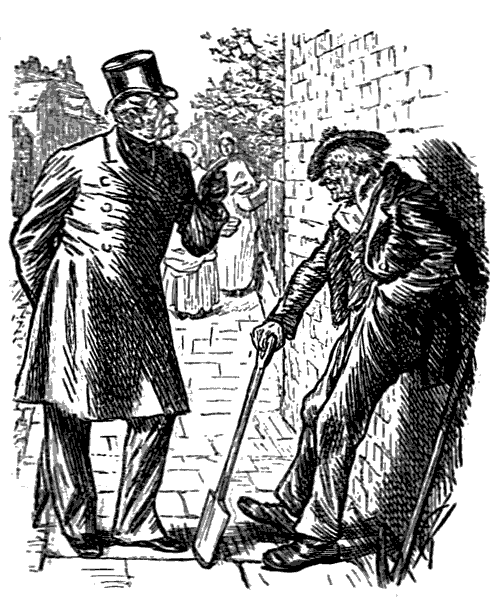
“LIVE AND LET LIVE”
Village Doctor (to the Grave-Digger, who is given to whisky). “Ah, John! I’m sorry to see you in this pitiable condition again!”
Grave-Digger. “Toots, sir! can ye no’ let a’e little fau’t o’ mine gae by? It’s mony a muckle ane o’ yours I ha’e happit owre, an’ said naething aboot!”
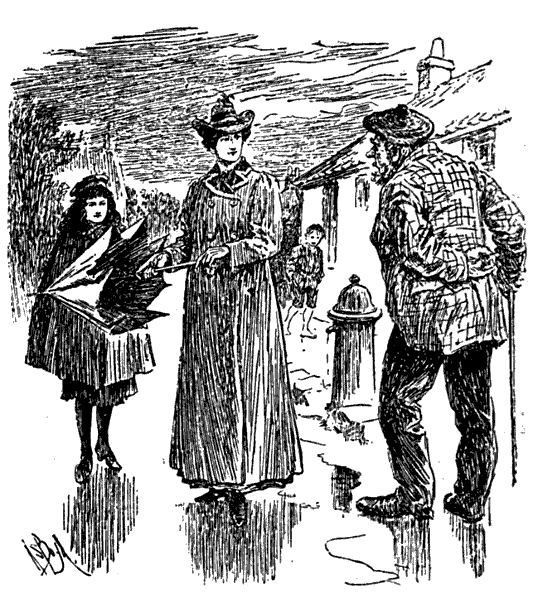
“SCOTCH MIST”
“The rain seems to be clearing off at last, Sandy.”
“Ay, I doot it’s threatenin’ to be dry!”
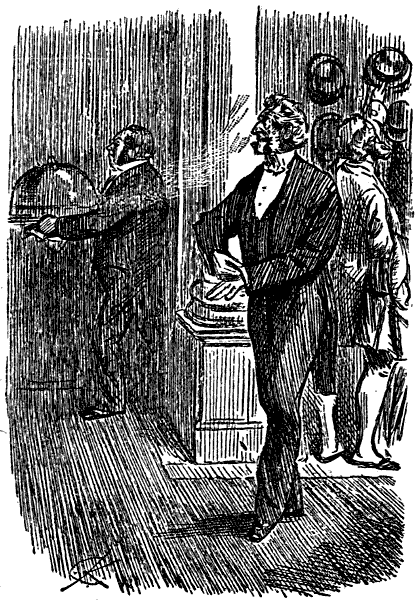
PROPHETIC!
Guest (late for dinner, the delicious odour of the Haggis, just coming up, met him in the hall).—“A——h!” (On second thoughts.) “E——h! I’ll be bad the morn!!”
Following their Noses.—We read a report of whales running ashore on the Orkney coast last week. They were of the bottle-nose kind, and probably followed their noses, tempted by the free flow of “het-pint,” a very tempting new year’s tipple, largely indulged in north of the Tweed.
Question. Why may Scotsmen be supposed to like policemen?
Answer. Eh, sirs, it’s just because they’re vera fond of the Bawbees.
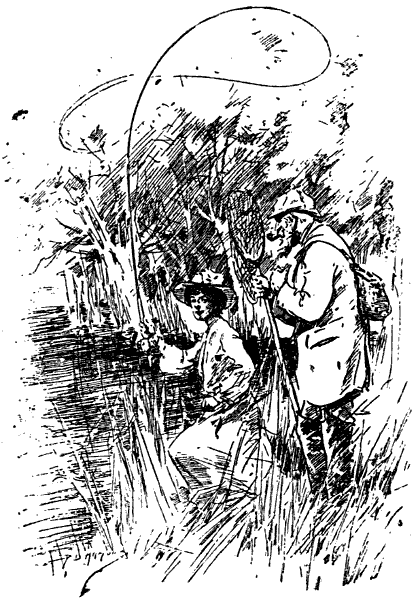
PRETTY DRY
Young Beginner (fishing with dry fly). “Am I keeping my fly properly dry, Duncan?”
Scots Keeper. “Oh, I’m thenkin’ she’ll be dry enough. She’s stickin up in that big willow near by where ye started fushin’.”
Loch Scrimpy Hotel, N.B.
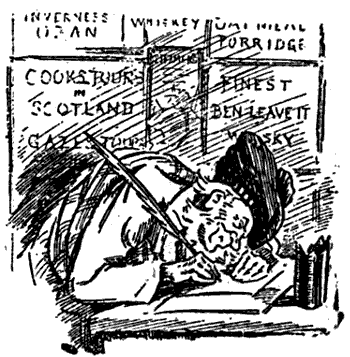
Dear Maister Punch,—I’ve heerd often enough aboot ye as a kind sort o’ buddy, whae putts the warld richt, when it has gaun wrang, and I’m thinking to write tae ye, a screed about thae feckless critters, the South’ren tourists whae owerrun Auld Scotland at this time o’ the year with their coo-ponds and their excursion tuckets, thinking to tak their pleesures on the cheap. Noo, the hotels in this country are famed for their vera moderate charges. I mysel have had a real good breakfast (they ca’ it dijohnny now) for no more than five shullings—that’s cheap enough. And as for a bed! weel, no one can find faut with half of a sovereign? And yet thae tourists are aye complainin’. Hotel folk in Scotland should have fixed charges throughout. I, for yin, will make free to say that I will cheerfully pay them, when I find it necessary, one pound ten shullin’s for bed and breakfast and maybe half-a-croon for a good glass of the cratur, as a settler afterwards. If the hotel folk would all agree to some moderate charge like that, they could think aboot Culloden with eequanimity!
Yours most friend-like,
Alexander Macwhustle.
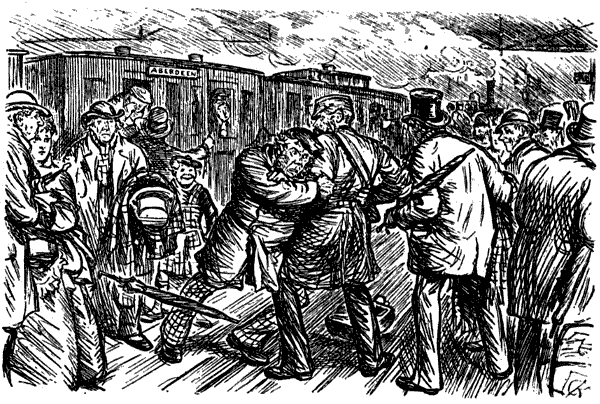
Guard (to excited passenger at the Edinburgh Station, just as the train is starting). “Ye’re too late, sir. Ye canna enter.”
Stalwart Aberdonian. “I maun!”
Guard (holding him back). “Ye canna.”
Aberdonian. “Tell ye I maun—I weel!” (Gripping Guard.) “If I maunna, ye sanna!!!”
BY A SPITEFUL COMPETITOR
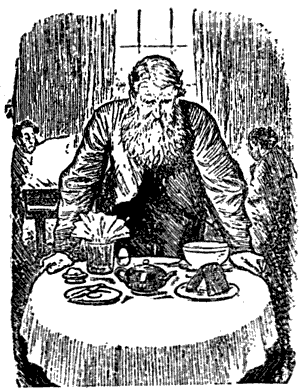
AT BILKINS’S ROYAL HOTEL (LIMITED), LONDON.
Mac (hungry). “Lo-or-sh keep’s! Ca’ this a br’akfast!!”
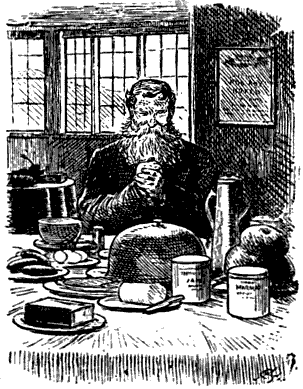
AT THE ROB ROY INN, PEEBLES, UNLIMITED!
THE PRINCIPAL REASON WHY MAC STAYED SUCH A SHORT TIME IN LONDON.
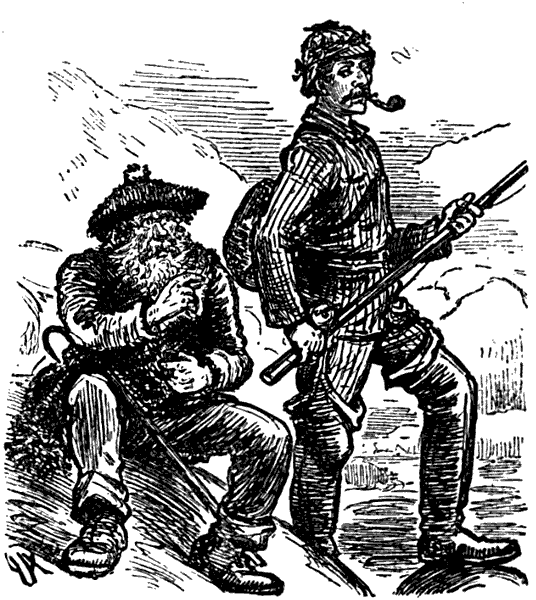
CANNY
“Why I dinna prayfair tae smoke, hech? Weel, noo loddie, I’ll joost tell ye. While’s ye’re smoking, ye blaw an’ blaw, an’ whaur is’t? But gin ye tak a guid pench, losh! mon, ye ken et’s there!”
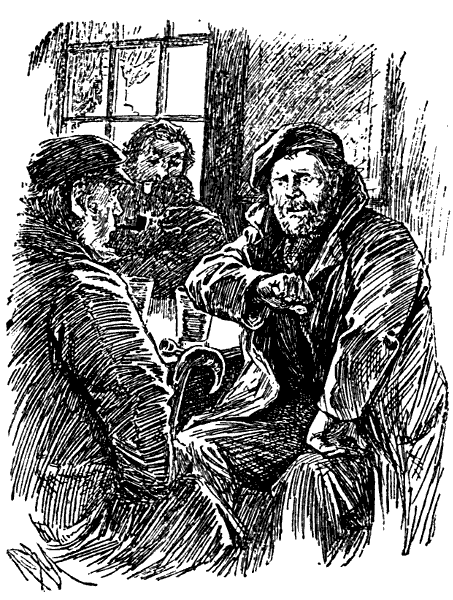
A WEIGHTY REASON
Rab. “They’re tellin’ me that Tam Stirdy’s turned oot a great poet since he gaed tae London.”
Allan. “Poet! Hoo could Tam Stirdy be a poet? Man, he was at the schule wi’ me!”
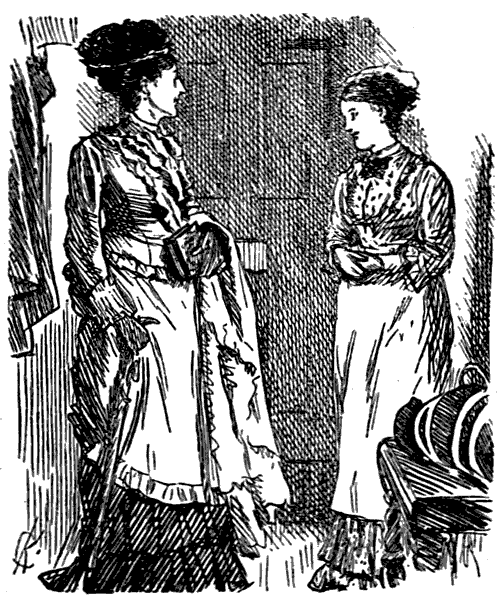
“SATISFACTORY”
Mistress. “Well, Jessie, I’m going into Nairn, and will see your mother. Can I give her any message from you?”
Jessie (her first “place”). “Ou, mem, ye can just say I’m unco weel pleased wi’ ye!!”
The Day and the Deed.—A certain Scottish Presbytery were sorely dumbfounded by an answer to a request of theirs for signature to a Sabbatarian petition. The reply (translated to them of course) was Laborare est orare.
Guard (to inebriated traveller, at junction). Now, sir, all change, please.
Traveller (with dignity). D’ye ken, mon, that I’ve got a return ticket?
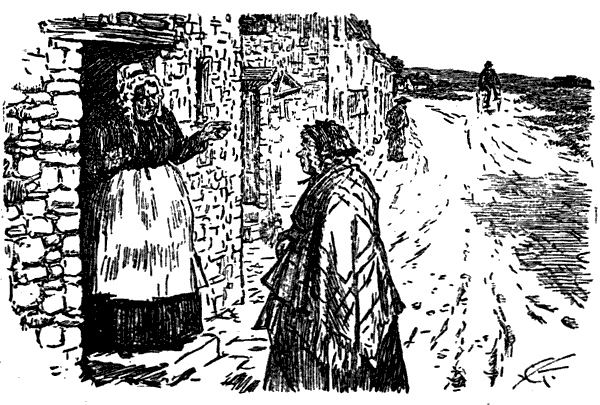
“ICHABOD!”
Scots Wife (to her gossip). “Ah dinna ken what’s come ower the Kirk. Ah canna bide to see oor menester spankin’ aboot on yon cyclopædy!”
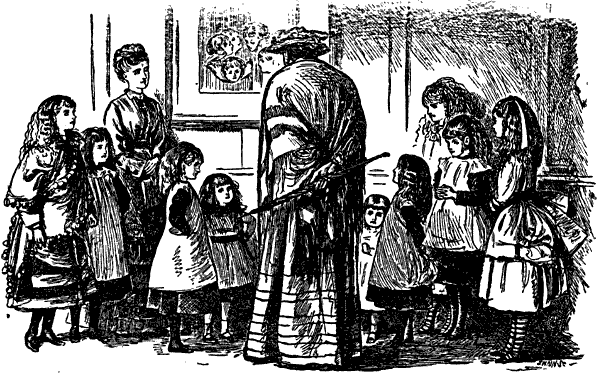
INTANGIBILITY
Severe Scots Schoolmistress (visiting some English friends). “Sir Joshua Reynolds, is it? Ah! vera pretty! And cherubs do vera weel in a picture; but I dinna care for bairnies whose feelings I can’t appeal to!”
IN EXPIATION
[B] A postcript to “A Ballad of Edinboro’ Toon.”
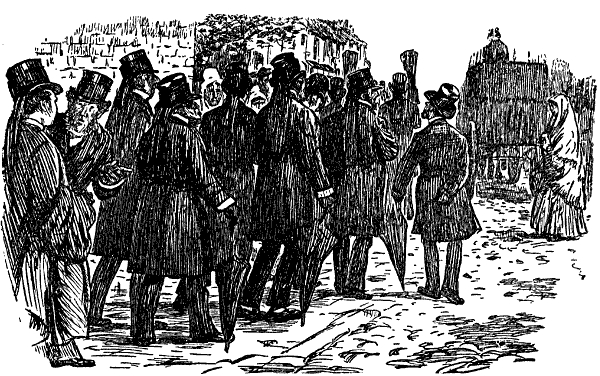
Follower (at the tail of the procession). “E—h, d’ye see yon wee Tam M‘Gowkie the-r-re! He maun be i’ th’ front, ye ken, whatever’s gaun on!”
His Companion. “I’ the front! Aye, mun”—(viciously)—“he’d be i’ the hea-arse if he could!”
Give every man his due, and his Mountain Dew if he claims it.
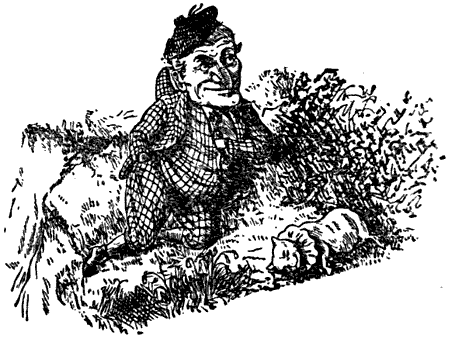
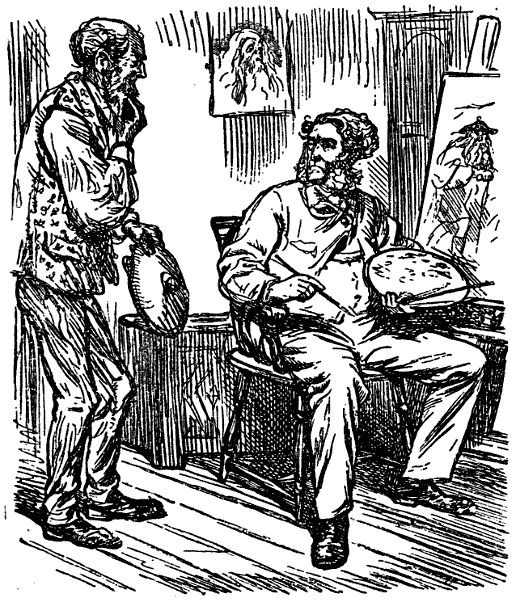
Model. “Fine day, sir.”
Painter (aghast). “Fine—good heavens, man! Where’s your beard? What have you done to your face?”
Model. “Me, sir? Naethin, but just made my whiskers a wee thing decent wi’ the shears.”
Painter. “Then you’re an utterly ruined man, sir! and I’m very sorry for you. You’re not worth twopence. Good morning.”
(“MR. PUNCH’S PRIZE NOVELS.”)
By J. Muir Kirrie, Author of “A Door on Thumbs,” “Eight Bald Fiddlers,” “When a Man Sees Double,” “My Gentleman Meerschaum,” &c.
[With this story came a glossary of Scots expressions. We have referred to it as we went along, and found everything quite intelligible. As, however, we have no room to publish the glossary, we can only appeal to the indulgence of our readers. The story itself was written in a very clear, legible hand, and was enclosed in a wrapper labelled, “Arcadia Mixture. Strength and Aroma combined. Sold in Six-shilling cases. Special terms for Southrons. Liberal allowance for returned empties.”]
We were all sitting on the pig-sty at T’nowhead’s Farm. A pig-sty is not, perhaps, a strictly eligible seat, but there were special reasons, of which you shall hear something later, for sitting on this particular pig-sty.
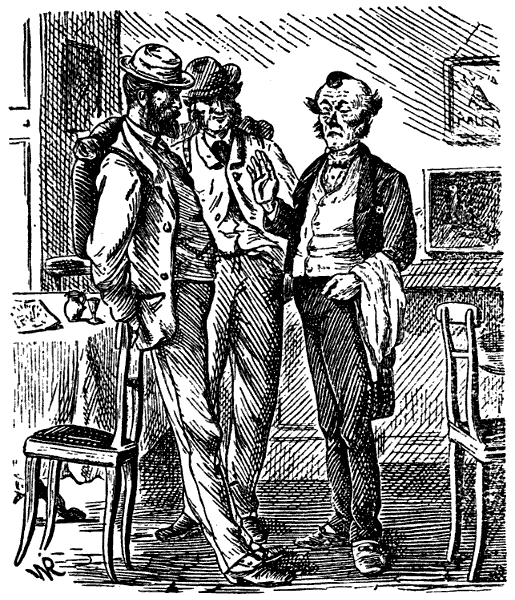
THE UNCO’ GUID
Scrupulous Waiter. “A what? A sangwitch! Na, na! I’ll gie ye breed an’ cheese, an’ as much whusky as ye can drink; but, tae mak’ sangwidges on the Saubberth day!”——
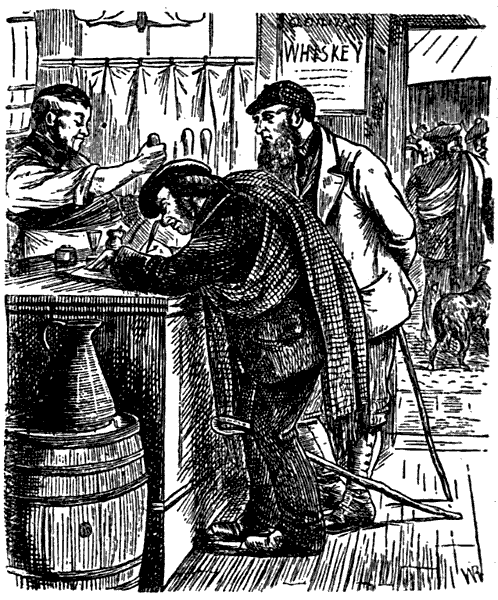
SKETCHED AT ISLINGTON
Purchaser. “K-a-t-l is no the way to spell ‘cattle.’”
Drover (writing the receipt). “Naebody could spell wi’ this pen. There’s been owre mony drucken bodies usin’ it!”
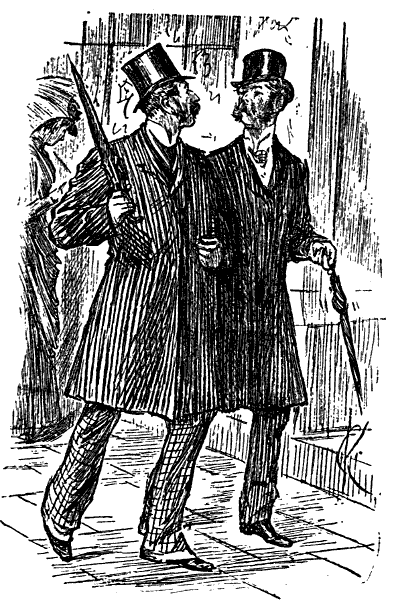
Southerner (in Glasgow, to Friend). “By the way, do you know McScrew?”
Northerner. “Ken McScrew? Oo’ fine! A graund man, McScrew! Keeps the Sawbath,—an’ everything else he can lay his hands on!”
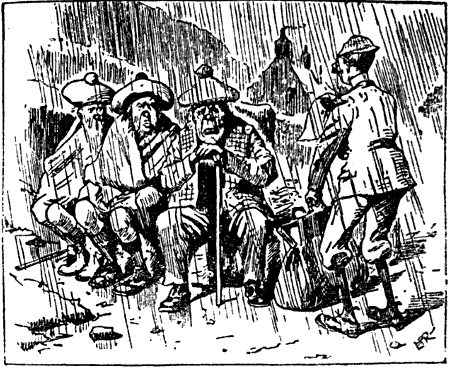
“SITTING ON THE PIG-STY AT T’NOWHEAD’S FARM.”
The old sow was within, extended at full length. Occasionally she grunted approval of what was said, but, beyond that, she seemed to show but a faint interest in the proceedings. She had been a witness of similar gatherings for some years, and, to tell the truth, they had begun to bore her, but, on the whole, I am not prepared to deny that her appreciation was an intelligent one. Behind us was the brae. Ah, that brae! Do you remember how the child you once were sat in the brae, spinning the peerie, and hunkering at I-dree I-dree I droppit-it? Do you remember that? Do you even know what I mean? Life is like that. When we are children the bread is thick, and the butter is thin; as we grow to be lads and lassies, the bread dwindles, and the butter increases; but the old men and women who totter about the commonty, how shall they munch when their teeth are gone? That’s the question. I’m a Dominie. What!—no answer? Go to the bottom of the class, all of you.
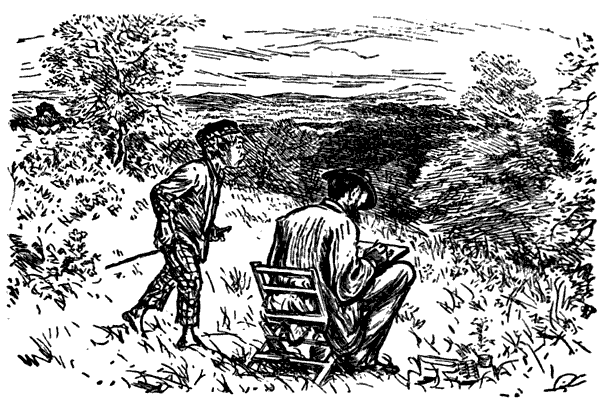
First Aberdonian (from the road). “Fat’s the man-nie deein’?”
Second Ditto (who has got over the wall to inspect). “He’s draain’ wi’ paint.”
First Boy. “Fat’s he draain? Is’t bonny?”
Second Ditto (after a pause, critically). “O, na, it’s onything but bonny!!”
As I said, we were all on the pig-sty. Of the habitués I scarcely need to speak to you, since you must know their names, even if you fail to pronounce them. But there was a stranger amongst us, a stranger who, it was said, had come from London. Yesterday when I went ben the house I found him sitting with Jess; to-day, he, too, was sitting with us on the pig-sty. There were tales told about him, that he wrote for papers in London, and stuffed his vases and his pillows with money, but Tammas Haggart only shook his head at what he called “such auld fowks’ yeppins,” and evidently didn’t believe a single word. Now Tammas, you must know, was our humorist. It was not without difficulty that Tammas had attained to this position, and he was resolved to keep it. Possibly he scented in the stranger a rival humorist whom he would have to crush. At any rate, his greeting was not marked with the usual genial cordiality characteristic of Scots weavers, and many were the anxious looks exchanged amongst us, as we watched the preparations for the impending conflict.
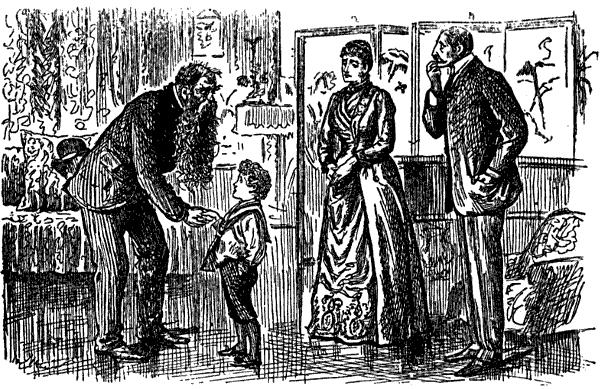
NORTH AND SOUTH (DIFFERENCES OF DIALECT).
The “Macwhuskey.” “Weel, my braw wee English laddie! Here have I come a’ the way to London to veesit y’r guid feyther and mither, that brought ye with ’em to see me in Thrumnitrochit last year—where ye rode a cockhorse on my knee! D’ye mind me, noo?”
The Braw Wee English Laddie. “Oh no—I don’t mind you—not a bit. It’s papa and mamma!”
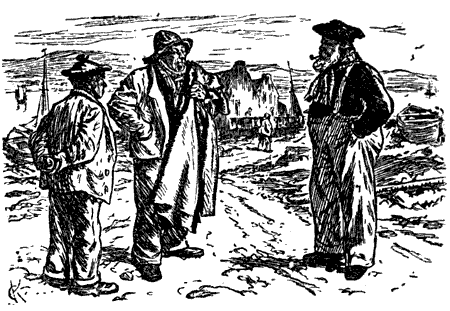
GOSSIPS
First Gael (just come ashore from the Herrin’ Fushin’) “Hoo’s a’ wi’ you, Donal’? Hae ye ony news yonder?”
Second Gael. “Na, I hear naething,—oo, aye,—they were sayin’ Mac Callum Mohr’s son’s goin’ to get marri’t!”
First Gael. “Ay! ay! An’ wha’s he goin’ to get marri’t on?”
Second Gael. “Ye ken the Queen—e-ch?”
First Gael. “Ay—I ken the Queen.”
Second Gael. “A—weel, it’s on her young dochter he’s goin’ to get marri’t.”
First Gael. “E—ch! Dod! the Queen mun be the prood woman!!!”
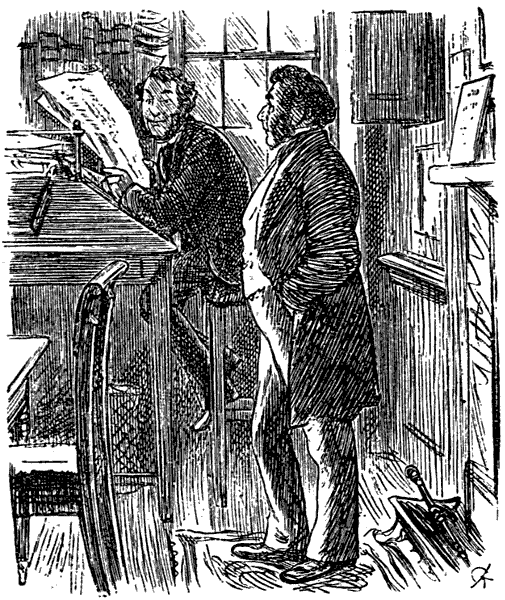
REAL DARING
M‘Phusky (Scots Partner). “Any war news this morning, Brown?”
Brown (English ditto). “Well, freights are low, money seems to be tight, and consols have fallen two——”
M‘Phusky. “Na, but war news, I mean.”
Brown (risking the operation). “Well, you wouldn’t wish to hear waur news than that, would you?”
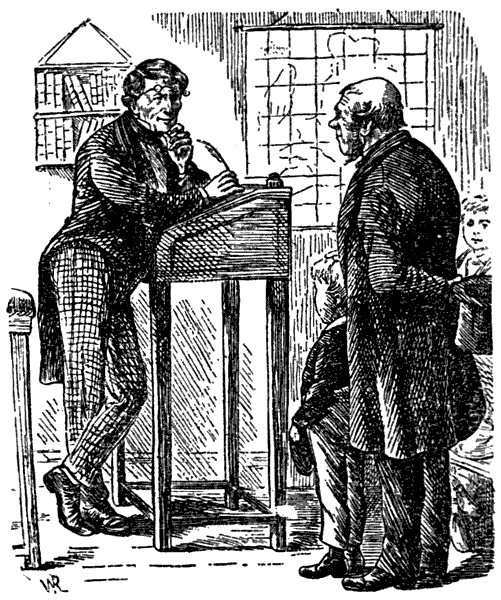
PRACTICAL
Fond Father. “I see ye’ve put my son intil graummer an’ jography. Noo, as I neither mean him tae be a minister or a sea-captain, it’s o’ nae use. Gie him a plain bizness eddication.”
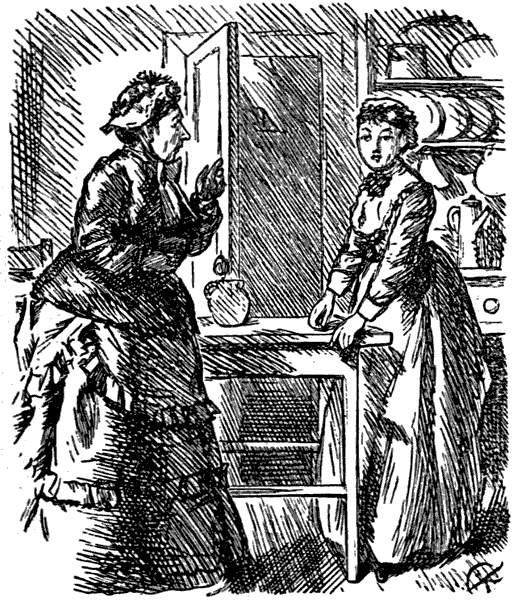
SABBATH-BREAKING
Scots Cook. “Whisht! There’s master whustlin’ o’ the Saubath! Losh save us! an’ ‘Maggie Lauder,’ too!”
After Tammas had finished boring half-a-dozen holes in the old sow with his sarcastic eye, he looked up, and addressed Hendry McQumpha.
“Hendry,” he said, “ye ken I’m a humorist, div ye no?”
Hendry scratched the old sow meditatively, before he answered.
“Ou ay,” he said, at length. “I’m no saying ’at ye’re no a humorist. I ken fine ye’re a sarcesticist, but there’s other humorists in the world, am thinkin’.”
This was scarcely what Tammas had expected. Hendry was usually one of his most devoted admirers. There was an awkward silence, which made me feel uncomfortable. I am only a poor Dominie, but some of my happiest hours had been passed on the pig-sty. Were these merry meetings to come to an end? Pete took up the talking.
“Hendry, my man,” he observed, as he helped himself out of Tammas’s snuff-mull, “ye’re ower kyow-owy. Ye ken humour’s a thing ’at spouts out o’ its ain accord, an’ there’s no nae spouter in Thrums ’at can match wi’ Tammas.”
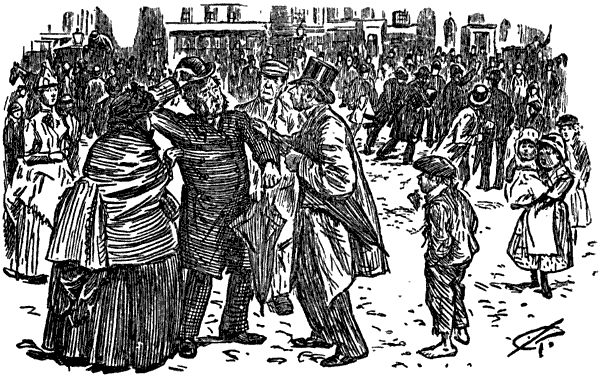
A VESTED INTEREST
Bystander (to excited Scot, whose friend had been run over). “Not a near relative, I hope, sir.”
Scot. “Na—but—he has on a pair of ma breeks!”
He looked defiantly at Hendry, who was engaged in searching for coppers in his north-east-by-east-trouser pocket. T’nowhead said nothing, and Hookey was similarly occupied. At last, the stranger spoke.
“Gentlemen,” he began, “may I say a word? I may lay claim to some experience in the matter. I travel in humour, and generally manage to do a large business.”
He looked round interrogatively. Tammas eyed him with one of his keen glances. Then he worked his mouth round and round to clear the course for a sarcasm.
“So you’re the puir crittur,” said the stone-breaker, “’at’s meanin’ to be a humorist.”
This was the challenge. We all knew what it meant, and fixed our eyes on the stranger.
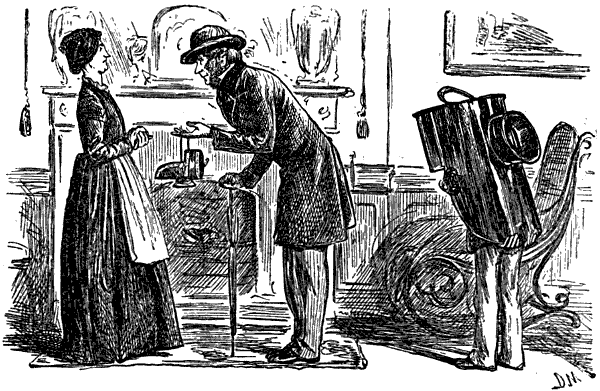
A TARTAR
Dr. M‘Currie (a chilly old soul), having ascertained from his landlady that coals are sixpence a scuttle, politely insists on providing a scuttle of his own, and begs to return, with many thanks, the charmingly tasteful article she had intended for his use.
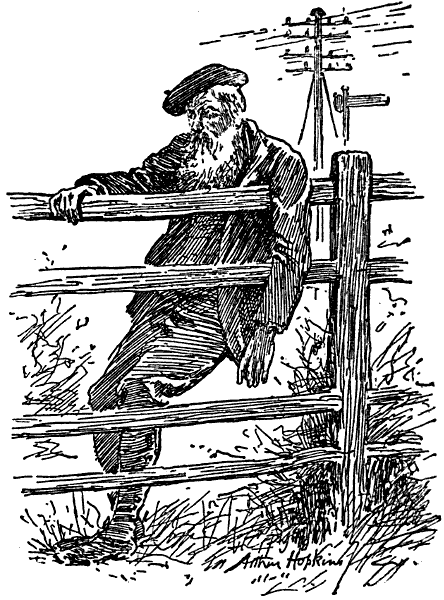
SOLILOQUY
“If I hold on, I’ll lose my train; if I let go, I’ll fa’! Did ever onybody hear tell o’ sic a predicament?”
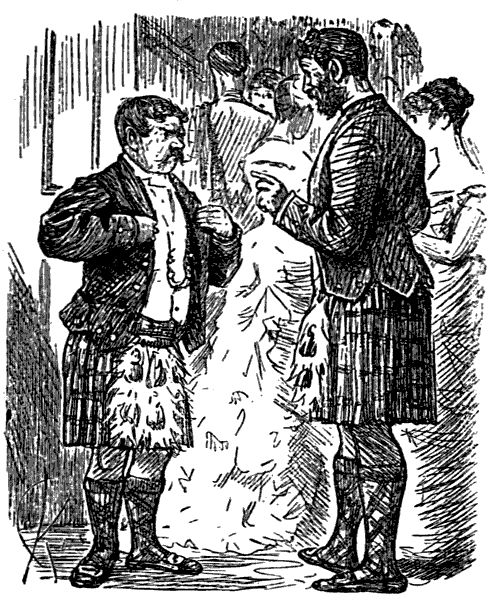
“THE GARB OF OLD GAUL”
Native (to visitor from the South). “Ah, you’ve donned the kilt! Quite killing, I declare! But why do you wear the Macdonald tartan when your name is Thompson?”
Little T. (who has been getting a good deal of chaff). “F’r a very good reason—’cause I’ve paid for it!”
[Retires in a huff.
“Certainly,” was his answer; “that is exactly my meaning. I trust I make myself plain. I’m willing to meet any man at catch-weights. Now here,” he continued, “are some of my samples. This story about a house-boat, for instance, has been much appreciated. It’s almost in the style of Mr. Jerome’s masterpiece; or this screamer about my wife’s tobacco-pipe and the smoking mixture. Observe,” he went on, holding the sample near to his mouth, “I can expand it to any extent. Puff, puff! Ah! it has burst. No matter, these accidents sometimes happen to the best regulated humorists. Now, just look at these,” he produced half-a-dozen packets rapidly from his bundle. “Here we have a packet of sarcasm—equal to dynamite. I left it on the steps of the Savile Club, but it missed fire somehow. Then here are some particularly neat things in cheques. I use them myself to paper my bedroom. It’s simpler and easier than cashing them, and besides,” adjusting his mouth to his sleeve, and laughing, “it’s quite killing when you come to think of it in that way. Lastly, there’s this banking-account sample, thoroughly suitable for journalists and children. You see how it’s done. I open it, you draw on it. Oh, you don’t want a drawing-master, any fellow can do it, and the point is it never varies. Now,” he concluded, aggressively, “what have you got to set against that, my friend?”
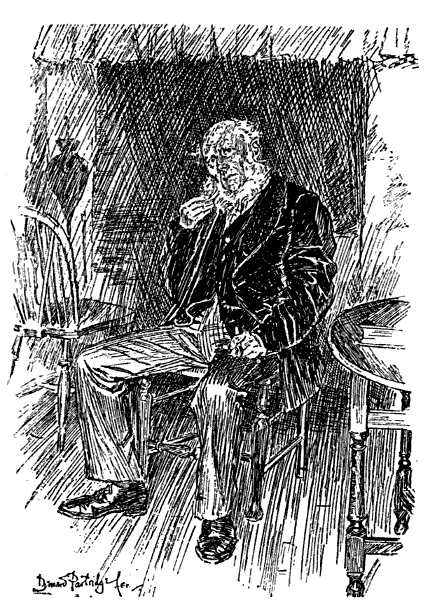
Sandy McPherson, in a moment of abstraction, put half-a-crown in the collection plate last Sunday in mistake for a penny, and has since expended a deal of thought as to the best way of making up for it. “Noo I might stay awa’ frae the kirk till the sum was made up; but on the ither han’ I wad be payin’ pew rent a’ the time an’ gettin’ nae guid o’ ’t. Losh! but I’m thinkin’ this is what the meenister ca’s a ‘releegious defficulty!’”
We all looked at Tammas. Hendry kicked the pail towards him, and he put his foot on it. Thus we knew that Hendry had returned to his ancient allegiance, and that the stranger would be crushed. Then Tammas began——
“Man, man, there’s no nae doubt ’at ye lauch at havers, an’ there’s mony ’at lauchs at your clipper-clapper, but they’re no Thrums fowk, and they canna’ lauch richt. But we maun juist settle this matter. When we’re ta’en up wi’ the makkin’ o’ humour, we’re a’ dependent on other fowk to tak’ note o’ the humour. There’s no nane o’ us ’at’s lauched at anything you’ve telt us. But they’ll lauch at me. Noo then,” he roared out, “‘A pie sat on a pear-tree.’”
We all knew this song of Tammas’s. A shout of laughter went up from the whole gathering. The stranger fell backwards into the sty a senseless mass.
“Man, man,” said Hookey to Tammas, as we walked home; “what a crittur ye are! What pit that in your heed?”
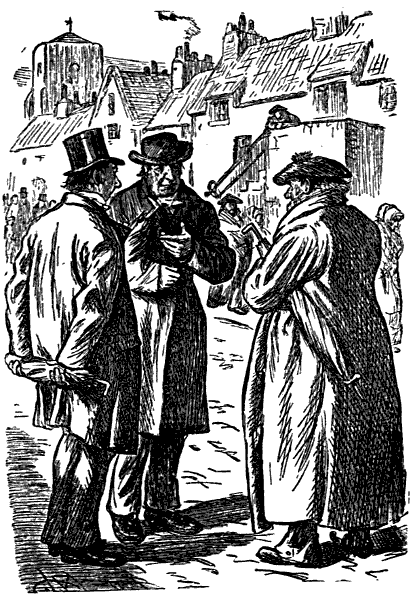
“THE QUEEN’S ENGLISH” (OR SCOTCH)
Minister. “Weel, John, an hoo did ye like ma son’s discoorse?”
John. “Weel, meenister, ah maun admeet he’s vera soond, but, oh man! he’s no deep! His pronoonciation’s no vera gweed; but ah’ve nae doobt he’ll impruv’!”
“It juist took a grip o’ me,” replied Tammas, without moving a muscle; “it flashed upon me ’at he’d no stand that auld song. That’s where the humour o’ it comes in.”
“Ou, ay,” added Hendry, “Thrums is the place for rale humour.” On the whole, I agree with him.
Air—“Ye banks and braes.”
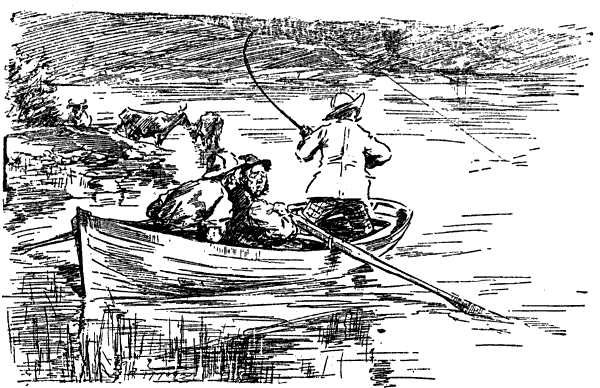
DIPLOMACY
First Boatman (sotto voce). “That’s only the weeds he’s caught.”
Second Boatman. “Haud yer tongue, ye muckle sumph! It’s a glass of whusky we’ll be gettin’ if the body thinks he’s lost a fush!”
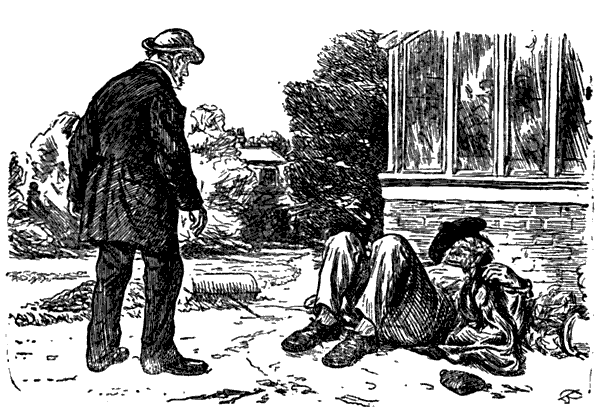
Country Gentleman (who thought he’d got such a treasure of a new gardener). “Tut, tut, tut! Bless my soul, Saunders! How——what’s all this? Disgracefully intoxicated at this hour of the morning! Ain’t you ashamed of yourself?!”
Saunders. “’Sh-hamed! (Hic.) Na, na, ’m nae sae drunk as that comes t’! Ah ken varra weel what a’m aboot!!”
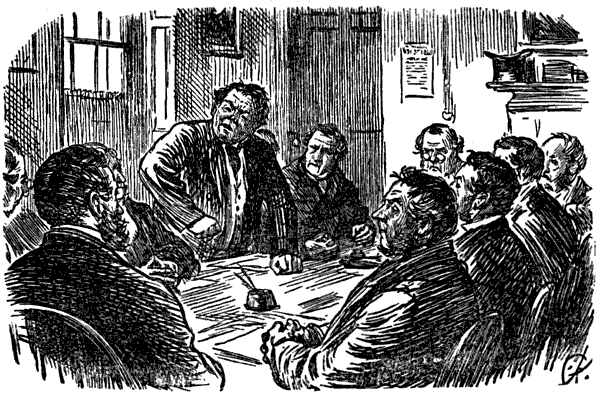
“SHOUTHER TO SHOUTHER!”
Obstinate Juryman (Licensed Victualler). “What! Gie a vardict agyen Mr. McLushy? Not if aw sit here a’ nicht! Aw’ll see ye a’ starved first! He’s one o’ the finest gen’lemen i’ the toon, an’ comes to ma billiard-table every nicht, and a’ nichts whiles!”
FROM THE LAYS OF A LAZY MINSTREL
[We have received a note from the Lazy One, saying that he is staying in the North of Scotland with the Maclather of Maclather. He says, if we were to hear the retainers sing “Rigs Awa’”—of which he encloses a copy—during dinner, accompanying themselves on the national instruments, sporans and claymores, we should never forget it. We don’t suppose we ever should.——On second thoughts, we do not believe he has been out of town at all, but that someone has sent him a guinea Christmas hamper. “Rigs Awa’,” indeed! We’ll give him a recht gude willie waght in his ee when we catch him.—Ed.]
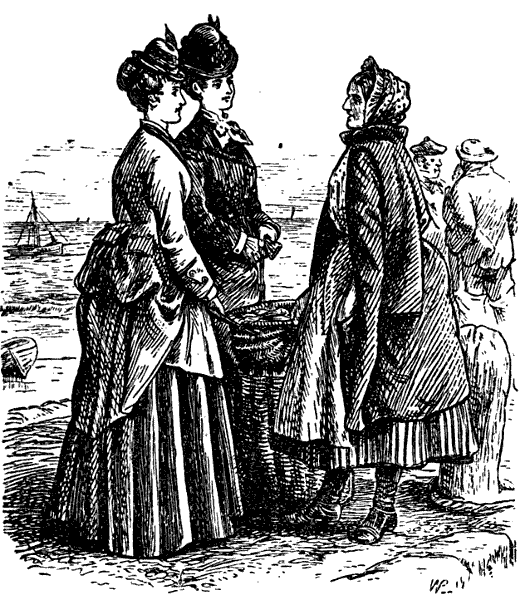
VERY HARD LINES
“Well, Kirsty, how’s business?”
“Middlin’, mem, jist middlin’. Some days we dae naething ava, an’ ithers we dae twice as muckle.”
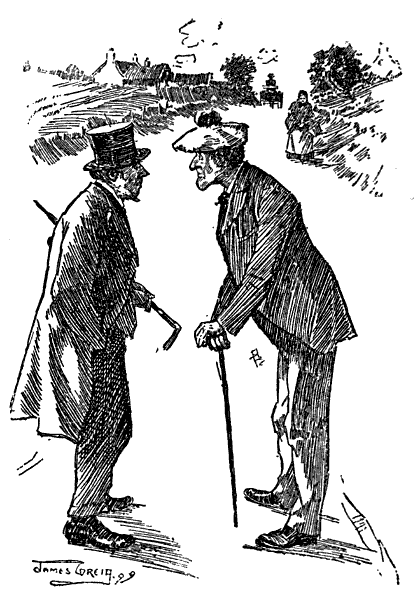
Tammas (to Friend, who has joined the teetotal). “There’s nae doot, Jeems, ye’re a much improved man,—but I’ve lost a freend!”
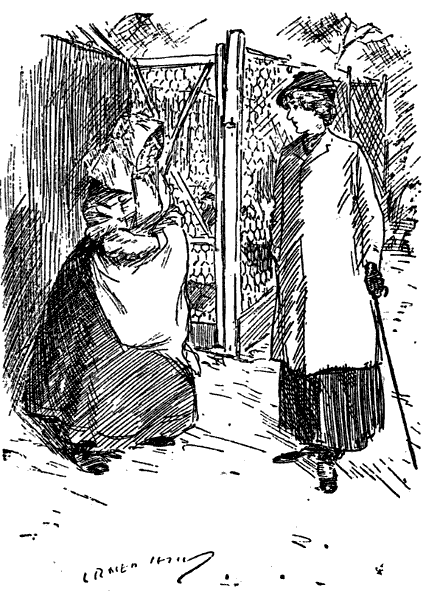
THRIFT!
Mabel (who has just concluded a bargain for a fowl). “Then I’ll tell mother you’ll kill it and send it up to-night.”
Mrs. Macfarlane. “Na, na, I’ll no kill it till the morn. I’m thinkin’ it’s goin’ to lay an egg this evenin’!”
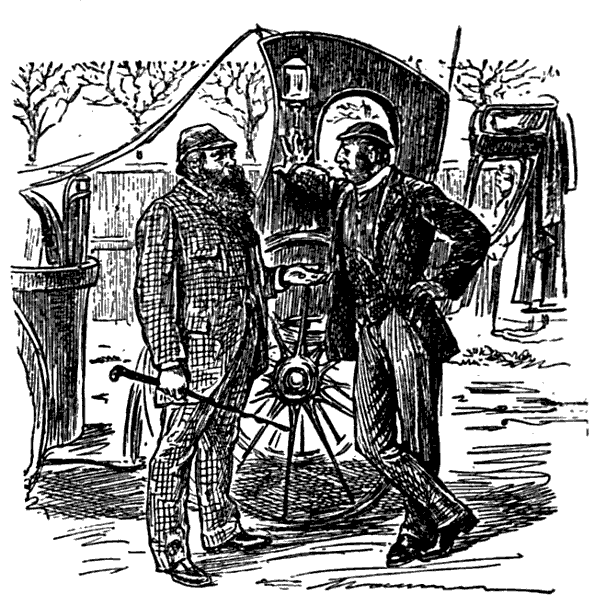
AN IRREVERENT SAXON
“My card, mon? I hanna got one! But I’d hae you to ken that I’m a Mackintosh!”
“You may be a Humbereller for all I knows, but my fare’s heighteenpence!”
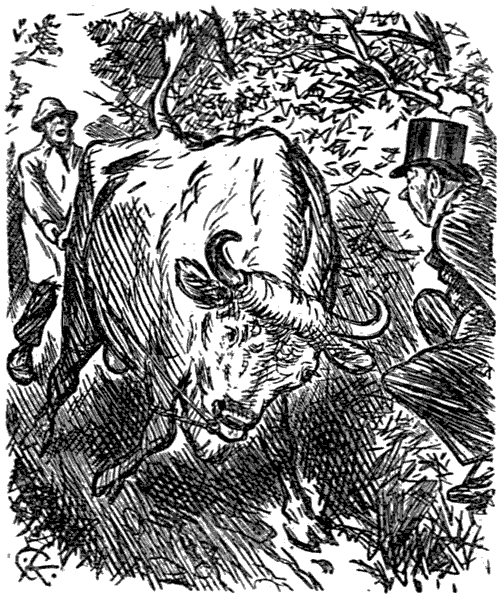
REASSURING!
Old Gent (suddenly turning corner in narrow lane). “Oh!—I say!—Is he?—Will he?”—(backing into hedge.)—“Can he?”——
Peasant. “Don’t take no notice of ’im, sir! I’ve got a wee bit check on ’im if he runs!!”
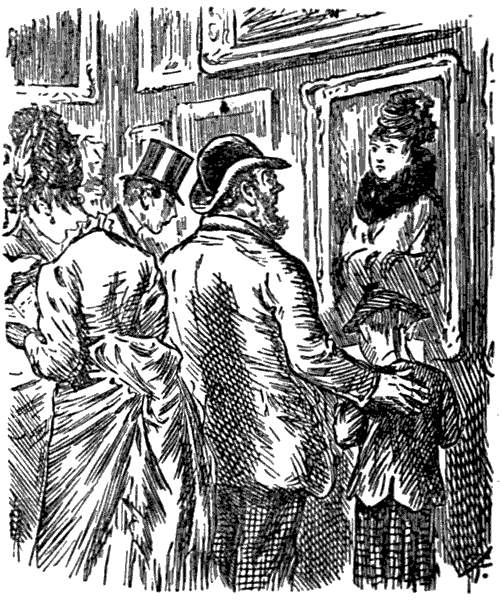
“THE VERNACULAR”
Old Gentleman, frae Aberdeen (at the Exhibition). “I say, Joack, look up the cat’logk an see fa that is wi’ the ‘Brechum’ [horse-collar] on!”
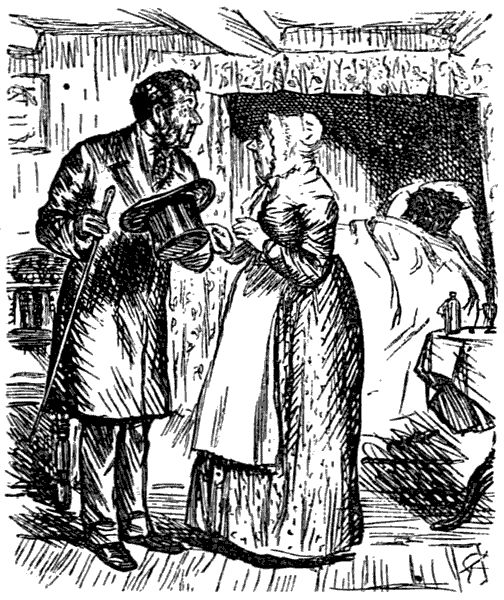
A NARCOTIC
Doctor. “Look here, Mrs. McCawdle. Don’t give him any more physic. A sound sleep will do him more good than anything.”
Gudewife. “E-h, docthor, if we could only get him tae the kirk!!”
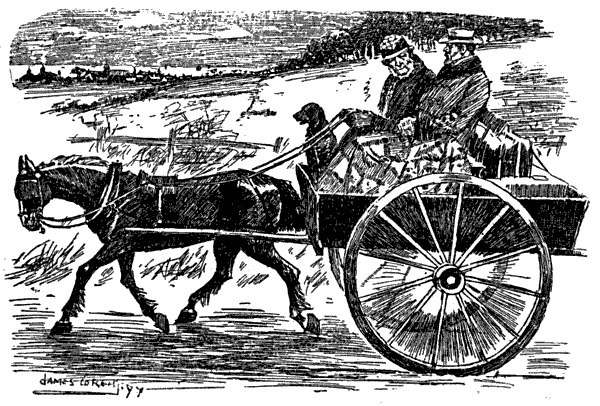
“AGE CANNOT WITHER, NOR CUSTOM STALE!”
Returned Native (to country carrier, who has given him a lift). “We don’t seem to be covering the ground so fast as we did twelve years ago.”
Carrier. “Ye’re wrang there, Mr. Broon, for it’s the same bit beastie!”
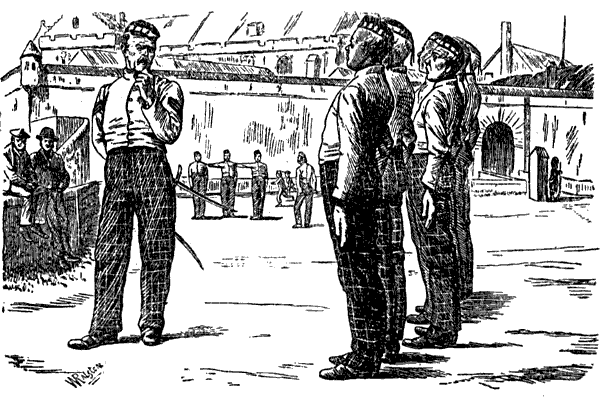
AWARE OF THE CRISIS
Sairgeant Mucklewham (more in sorrow than anger). “Halt! O Man Nummer Three, I wunner tae sae ye! Hoo can ye think Foreign Powers can ever respect ye, if ye wull persist in steppin’ three inches less than the regelation!”
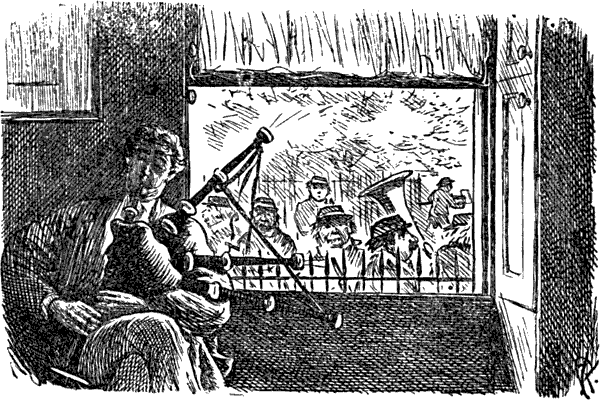
PUT TO THE ROUT
Distracted Bandster. “Komm avay—komm avay—ee zhall nod give you nodingsh—ee vill blay de moozeek erselbst! Teufel!”
[They retreat hastily.
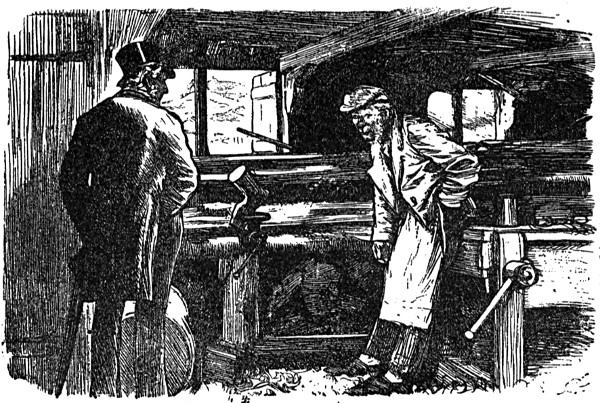
BOTH SIDES OF THE QUESTION
Dissipated Tradesman (to the expostulations of the minister). “Ye’re aye crackin’ at me about my drinkin’, sir, but you don’t consider my drooth!!”
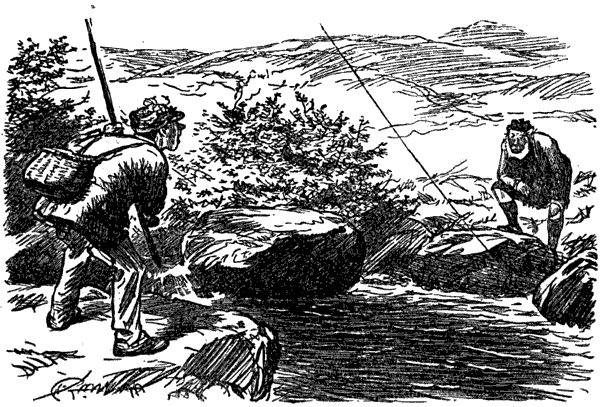
“PHYSICAL GEOGRAPHY”
English Angler (on this side of the Tweed). “Hi, Donald! come over and help me to land him—a 20-pounder I’ll swear——”
Highlander (on the other). “It wull tak’ ye a lang time to lan’ that fush too, d’ye ken, sir, whatever!—Ye hae heuket the kingdom o’ auld Scotland!”
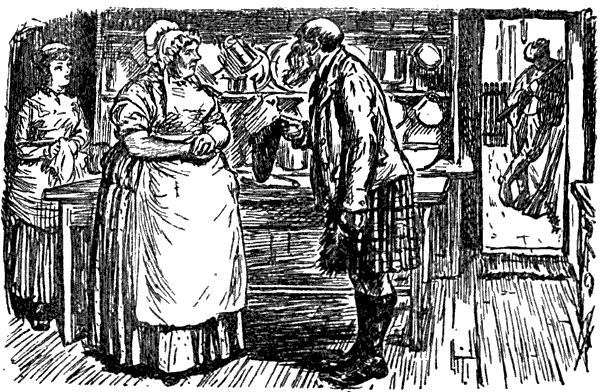
Northern Gamekeeper. “Will ye gie me some oil to my guns this morning, cook?”
Cook. “If ye wunt oil frae me, ‘keeper,’ ye’ll need to mind. Ma name’s no cook—ma name’s Misthress Macphairson!”
Gamekeeper (with a sniff). “Weel, gin ye’re no to be ‘cook,’ I’m nae to be ‘keeper’! Ye’ll be as gude as gie me ‘Maisther Forr-biss’!!”
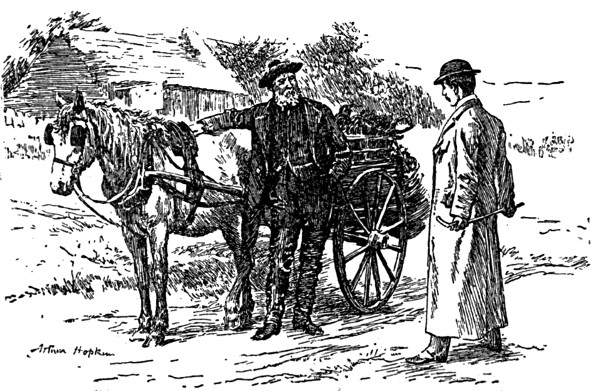
VACCINATION RE-NAMED
The New Doctor. “Well, Mac, how is the little girl’s arm going on?”
Mac. “Weel, sir, my gudewife says it’s looking just fine whaur ye tattoo’d it.”
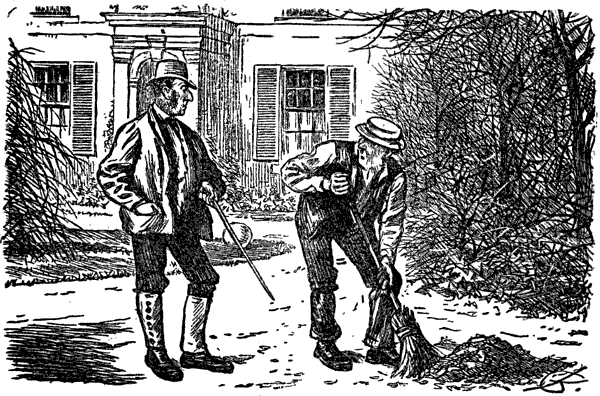
“WHAT IN THE CAPTAIN’S BUT A CHOLERIC WORD”
The Laird (to his Gardener, who had caught somebody trespassing). “Hum! And you say, Saunders, that the fellow was impudent?”
Gardener. “‘Impident!’ ’Deed, sir, if he had been the Laird himsell he could na hae been mair ill-bred!”
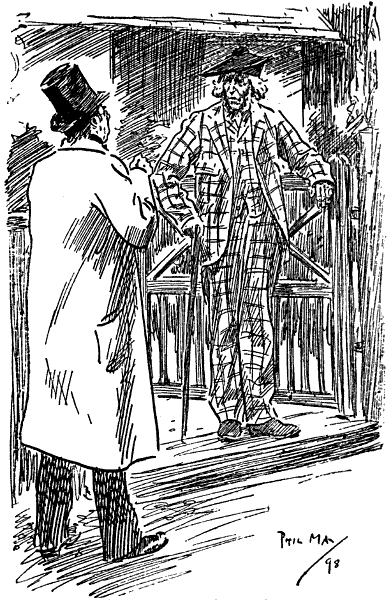
MacNab (whose wife has met with a slight accident on the railway, to Railway Agent, who has called to offer condolence, and produces one or two pounds by way of solatium). “Na, na, if she dees it will likely be twa or three hunders!”
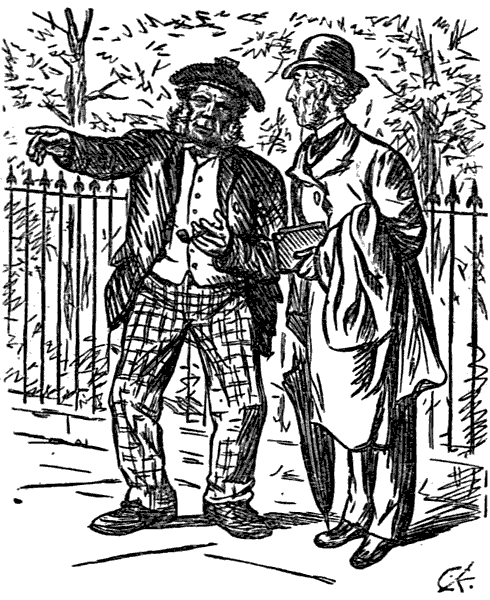
A MODERN ATHENIAN
Southern Tourist (in Edinburgh). “Can you direct me to the Royal Institution?”
Native. (Vacant Stare.) “What est?”
Tourist (giving a Clue). “Pictures, you know—Statues—and——”
Native (after much thought). “Oo!—et’s the Stukky Feggars ye mean!”—(Pointing.)—“Yon’s et!”
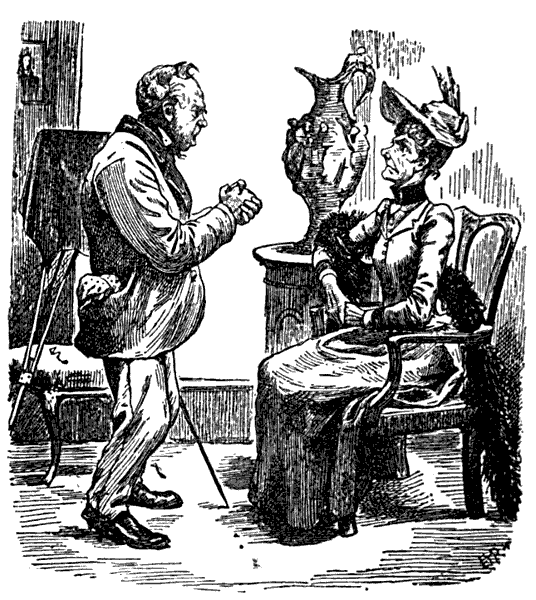
A POSER
Fair Client. “I’m always photographed from the same side, but I forget which!”
Scots Photographer (reflectively). “Well, it’ll no be this side, I’m thinkin’. Maybe it’s t’ither!”
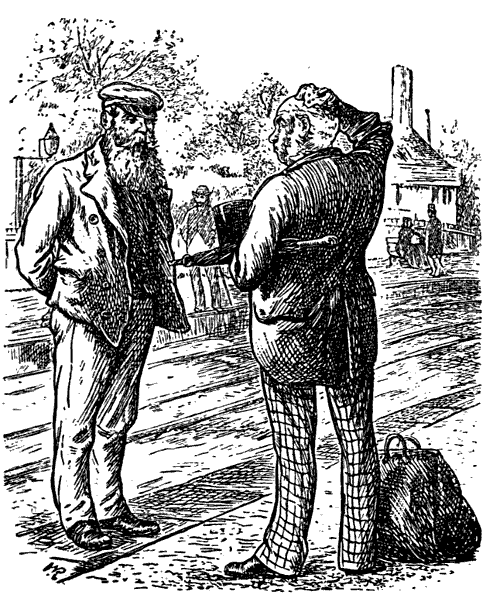
A NICE DISTINCTION
Porter. “Train’s awa, man. Ye should hae ran faster.”
Passenger. “Ran faster! Dod, I ran fast eneugh, but I should hae startit sooner.”
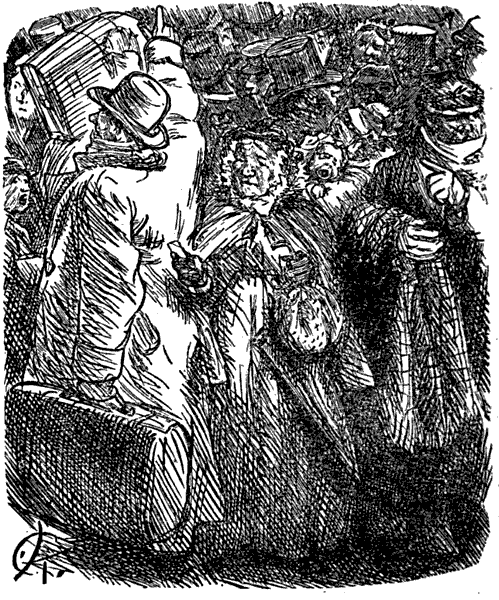
“ALARUMS, EXCURSIONS”
Perplexed Old Lady (at Scottish Junction in a fog). “Ah hae ma bundle—an’ ah hae ma teeck’t—but fa’s the Deeside Rel-ro’d!!”
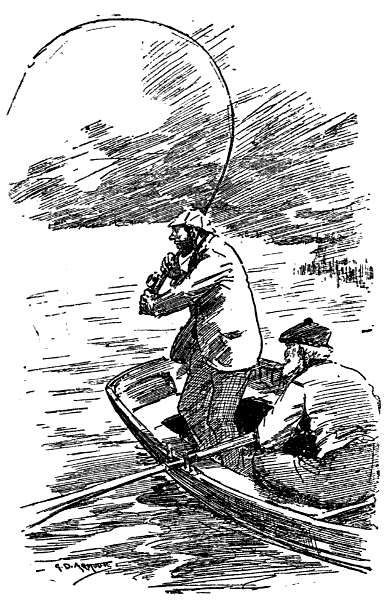
Excited Scotsman (who has just hooked a fish). “I’m dashed feared I’ll loose my half-crown flee!”
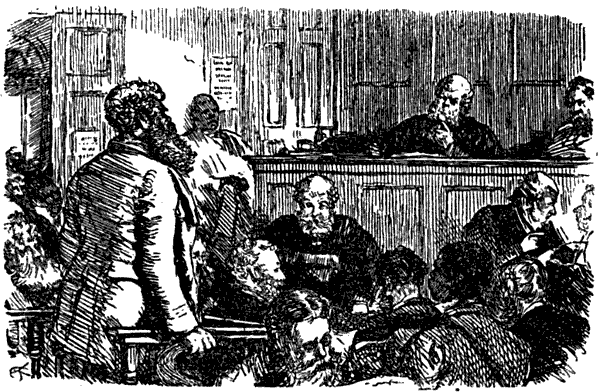
“WHEN GREEK MEETS GREEK.” Scene—District Court in a Colony
Scots Judge (with a very marked pug-nose). “Weel, noo, sir, if ye gae along the ro’d in question, where’ll ye gang tae?”
Scots Witness (deliberately). “That a’ depends, yer honour, on how far ye gae!”
Judge (snappishly). “Ye understan’ vera weel, sir. If ye follow yer nose, mun, where’ll ye gang till?”
Witness (after a pause). “Ah’ve always heer-ed it said, yer honour, that if ye follow yer nose too far, it’ll tak’ ye t’ the moon!”
Judge. “Step doon, sir!”—(In an angry aside).—“The mon’s a fool!”
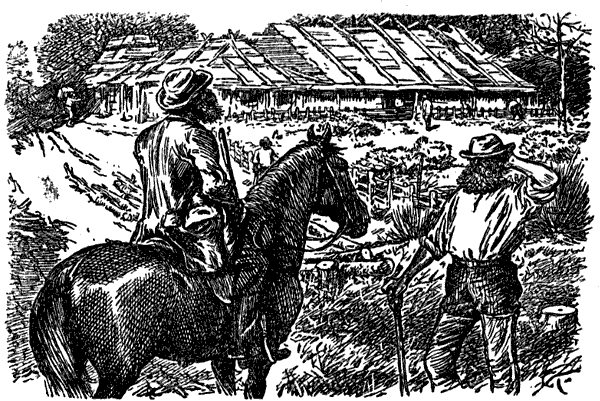
Traveller (to Colonial Squatter). “Hullo, McDonald! I didn’t expect this of you! All your men working on a Sunday!”
Mac. “This is nae Sunday, mun!—it’s Wednesday——”
Traveller. “Not a bit of it! This is Sunday, I assure you——”
Mac. “Aweel! Think o’ that, noo! We hinna seen a sowl for three months, an’ there’s nae an almanack i’ the hoose, an’ we’ve gotten jummelt up a’ th’gether!!”
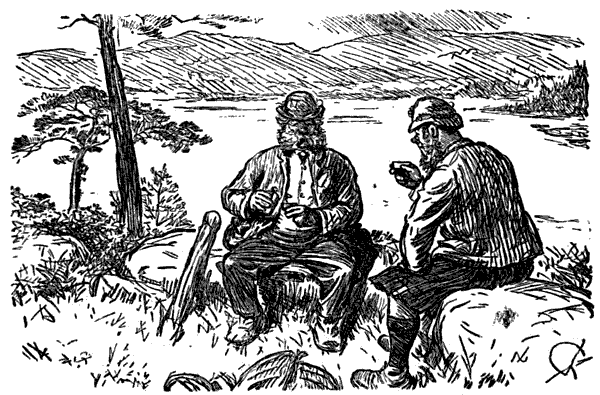
Malcolm (to the Colonel, who had been narrating his fishing adventures all over the globe). “Ye must ha’e had gran’ sport among the black men, sir! Hed they ony releegion?”—Colonel. “All kinds, Malcolm. Some worshipped idols, some the sun, some the moon, some the water——”
Malcolm. “The watter!” (Musing.) “Aweel, sir, I couldna’ bring mysel’ to care for that!”
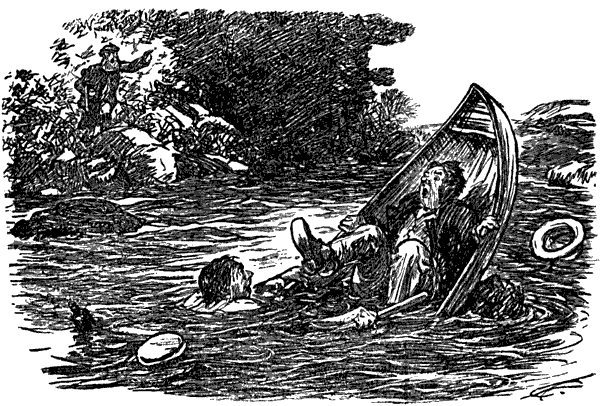
Keeper (to the two Tourists, who find canoeing more difficult on the Highland rivers than on the Thames). “Hi! Hoy! Hoy! D’ye no ken this is the McChizzlem’s private watter!?”
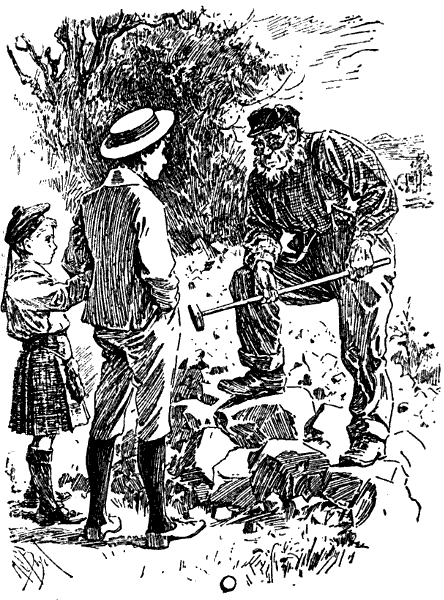
MAGNIFYING HIS CALLING
Peter. “Na, laddie, this is ane o’ thae things a body can never learn. There’s no nae use in a man takin’ tae this job unless he has a naiteral born aptitude for’d!”
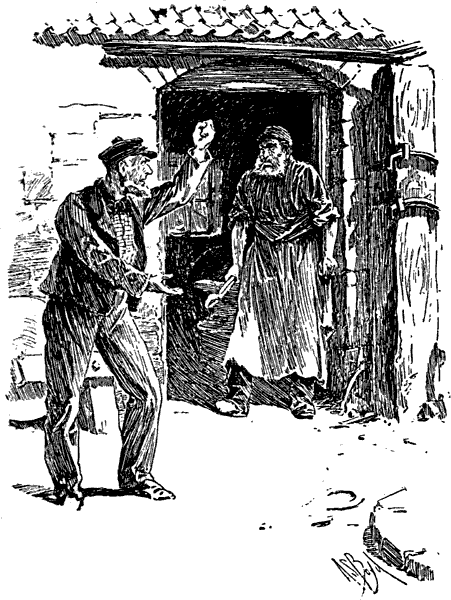
GOING TO EXTREMES
He of the ruffled temper. “As sure’s ma name’s Tammas Paterson, I’ll hae the law o’ ye, though it should cost me hauf-a-croon!”
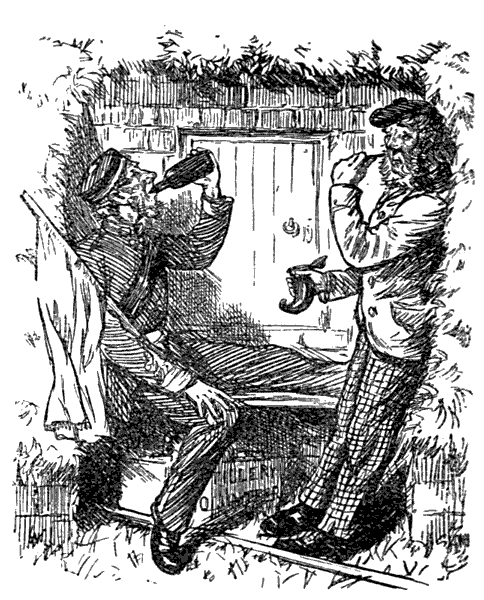
CARBINE PRACTICE
Sandy McGuttle and a friend of his marking in butt. Officer in charge of squad at the shooting-range wonders why the deuce they don’t signal that last shot. He has also grave doubts about the number of bulls’-eyes already recorded.
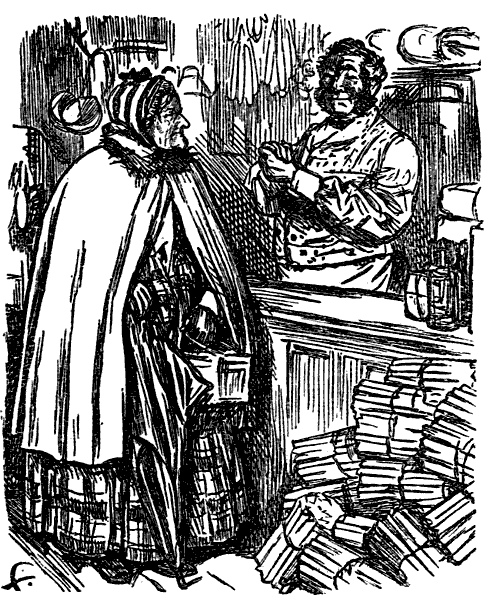
STAUNCH
Old Lady (who had been buying eggs). “’Deed, Mr. McTreacle, butchers’ meat’s sae dear now-a-days ah’m no able to buy’t!”
Grocer. “You should turn a vegetarian——”
Old Lady. “A veegetarian!—Na, na! ah was born an’ brocht up i’ the Free Kirk, an’ a’m no gaun ta change ma releegion i’ m’ auld days!”
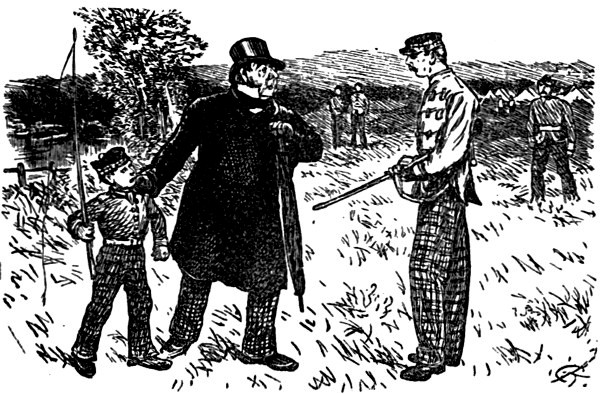
Officer of Militia. “Well, sir, who are you? and what’s the matter?”
Excited Citizen. “Me? I’m the bailie—the heid bailie, mon! I catched this wee laddie feshin’ on the Sawbath day! Says he’s a Caath’lic—a Rooman Caath’lic!! E-h, it’s just dreadfu’ to think o’—feshin’ in a Protestant loch!! And o’ the Sawbath! Lord save us!”
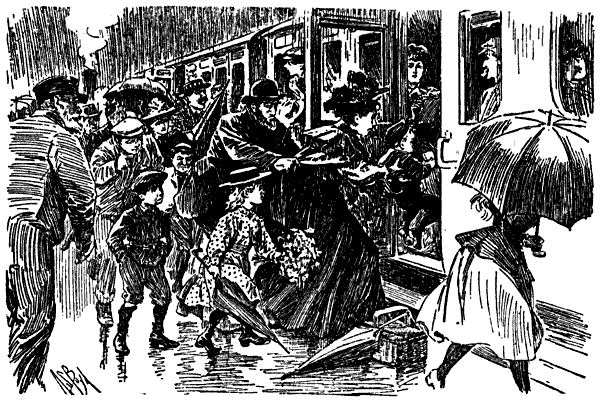
RESIGNATION
He (Third-Class). “Come awa’! D’ye no see that’s a first-class?”
She (ditto). “Aweel, on a busy day like this, we maun just put up wi’ ony accommodation we can get!!”
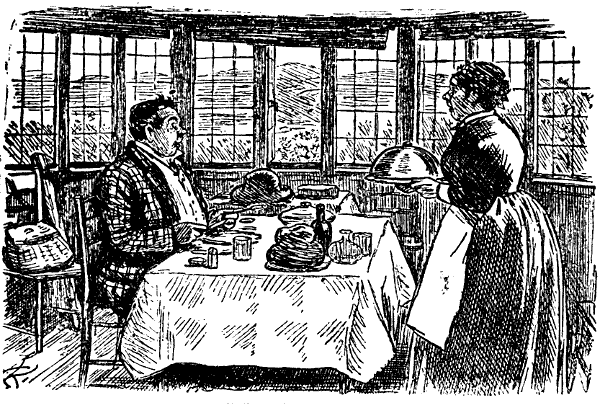
DESECRATION.
English Angler (on Saturday evening). “Anybody ever fish up here on a Sunday, m’um?”
Scots Landlady (in consternation). “Hech, mon! ye’d be jail’t!!”
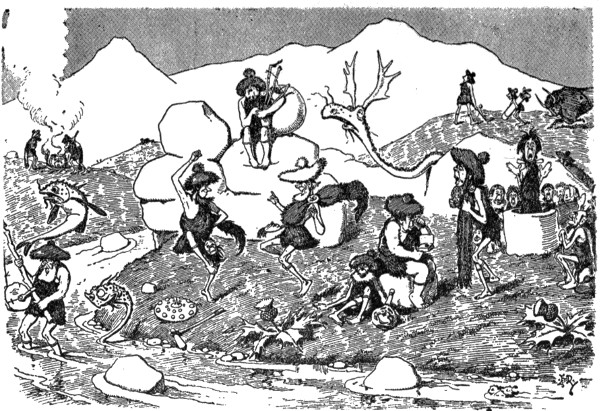
“PREHISTORIC SCOTLAND” DE-PICT-ED
(Not by Dr. Robert Munro.)
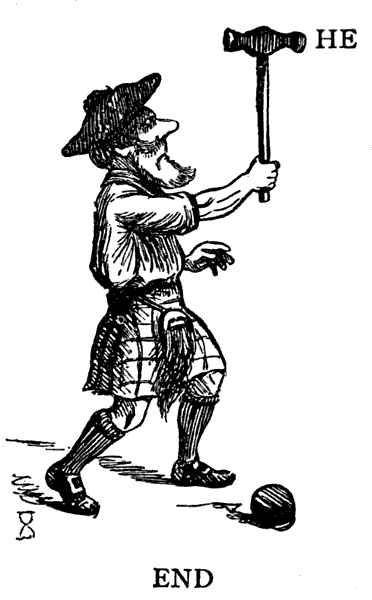
BRADBURY, AGNEW. & CO. LD., PRINTERS, LONDON AND TONBRIDGE
Transcriber’s Notes:
End of the Project Gutenberg EBook of Mr. Punch's Scottish Humour, by Various
*** END OF THIS PROJECT GUTENBERG EBOOK MR. PUNCH'S SCOTTISH HUMOUR ***
***** This file should be named 49309-h.htm or 49309-h.zip *****
This and all associated files of various formats will be found in:
http://www.gutenberg.org/4/9/3/0/49309/
Produced by Chris Curnow, Elisa and the Online Distributed
Proofreading Team at http://www.pgdp.net (This file was
produced from images generously made available by The
Internet Archive)
Updated editions will replace the previous one--the old editions will
be renamed.
Creating the works from print editions not protected by U.S. copyright
law means that no one owns a United States copyright in these works,
so the Foundation (and you!) can copy and distribute it in the United
States without permission and without paying copyright
royalties. Special rules, set forth in the General Terms of Use part
of this license, apply to copying and distributing Project
Gutenberg-tm electronic works to protect the PROJECT GUTENBERG-tm
concept and trademark. Project Gutenberg is a registered trademark,
and may not be used if you charge for the eBooks, unless you receive
specific permission. If you do not charge anything for copies of this
eBook, complying with the rules is very easy. You may use this eBook
for nearly any purpose such as creation of derivative works, reports,
performances and research. They may be modified and printed and given
away--you may do practically ANYTHING in the United States with eBooks
not protected by U.S. copyright law. Redistribution is subject to the
trademark license, especially commercial redistribution.
START: FULL LICENSE
THE FULL PROJECT GUTENBERG LICENSE
PLEASE READ THIS BEFORE YOU DISTRIBUTE OR USE THIS WORK
To protect the Project Gutenberg-tm mission of promoting the free
distribution of electronic works, by using or distributing this work
(or any other work associated in any way with the phrase "Project
Gutenberg"), you agree to comply with all the terms of the Full
Project Gutenberg-tm License available with this file or online at
www.gutenberg.org/license.
Section 1. General Terms of Use and Redistributing Project
Gutenberg-tm electronic works
1.A. By reading or using any part of this Project Gutenberg-tm
electronic work, you indicate that you have read, understand, agree to
and accept all the terms of this license and intellectual property
(trademark/copyright) agreement. If you do not agree to abide by all
the terms of this agreement, you must cease using and return or
destroy all copies of Project Gutenberg-tm electronic works in your
possession. If you paid a fee for obtaining a copy of or access to a
Project Gutenberg-tm electronic work and you do not agree to be bound
by the terms of this agreement, you may obtain a refund from the
person or entity to whom you paid the fee as set forth in paragraph
1.E.8.
1.B. "Project Gutenberg" is a registered trademark. It may only be
used on or associated in any way with an electronic work by people who
agree to be bound by the terms of this agreement. There are a few
things that you can do with most Project Gutenberg-tm electronic works
even without complying with the full terms of this agreement. See
paragraph 1.C below. There are a lot of things you can do with Project
Gutenberg-tm electronic works if you follow the terms of this
agreement and help preserve free future access to Project Gutenberg-tm
electronic works. See paragraph 1.E below.
1.C. The Project Gutenberg Literary Archive Foundation ("the
Foundation" or PGLAF), owns a compilation copyright in the collection
of Project Gutenberg-tm electronic works. Nearly all the individual
works in the collection are in the public domain in the United
States. If an individual work is unprotected by copyright law in the
United States and you are located in the United States, we do not
claim a right to prevent you from copying, distributing, performing,
displaying or creating derivative works based on the work as long as
all references to Project Gutenberg are removed. Of course, we hope
that you will support the Project Gutenberg-tm mission of promoting
free access to electronic works by freely sharing Project Gutenberg-tm
works in compliance with the terms of this agreement for keeping the
Project Gutenberg-tm name associated with the work. You can easily
comply with the terms of this agreement by keeping this work in the
same format with its attached full Project Gutenberg-tm License when
you share it without charge with others.
1.D. The copyright laws of the place where you are located also govern
what you can do with this work. Copyright laws in most countries are
in a constant state of change. If you are outside the United States,
check the laws of your country in addition to the terms of this
agreement before downloading, copying, displaying, performing,
distributing or creating derivative works based on this work or any
other Project Gutenberg-tm work. The Foundation makes no
representations concerning the copyright status of any work in any
country outside the United States.
1.E. Unless you have removed all references to Project Gutenberg:
1.E.1. The following sentence, with active links to, or other
immediate access to, the full Project Gutenberg-tm License must appear
prominently whenever any copy of a Project Gutenberg-tm work (any work
on which the phrase "Project Gutenberg" appears, or with which the
phrase "Project Gutenberg" is associated) is accessed, displayed,
performed, viewed, copied or distributed:
This eBook is for the use of anyone anywhere in the United States and
most other parts of the world at no cost and with almost no
restrictions whatsoever. You may copy it, give it away or re-use it
under the terms of the Project Gutenberg License included with this
eBook or online at www.gutenberg.org. If you are not located in the
United States, you'll have to check the laws of the country where you
are located before using this ebook.
1.E.2. If an individual Project Gutenberg-tm electronic work is
derived from texts not protected by U.S. copyright law (does not
contain a notice indicating that it is posted with permission of the
copyright holder), the work can be copied and distributed to anyone in
the United States without paying any fees or charges. If you are
redistributing or providing access to a work with the phrase "Project
Gutenberg" associated with or appearing on the work, you must comply
either with the requirements of paragraphs 1.E.1 through 1.E.7 or
obtain permission for the use of the work and the Project Gutenberg-tm
trademark as set forth in paragraphs 1.E.8 or 1.E.9.
1.E.3. If an individual Project Gutenberg-tm electronic work is posted
with the permission of the copyright holder, your use and distribution
must comply with both paragraphs 1.E.1 through 1.E.7 and any
additional terms imposed by the copyright holder. Additional terms
will be linked to the Project Gutenberg-tm License for all works
posted with the permission of the copyright holder found at the
beginning of this work.
1.E.4. Do not unlink or detach or remove the full Project Gutenberg-tm
License terms from this work, or any files containing a part of this
work or any other work associated with Project Gutenberg-tm.
1.E.5. Do not copy, display, perform, distribute or redistribute this
electronic work, or any part of this electronic work, without
prominently displaying the sentence set forth in paragraph 1.E.1 with
active links or immediate access to the full terms of the Project
Gutenberg-tm License.
1.E.6. You may convert to and distribute this work in any binary,
compressed, marked up, nonproprietary or proprietary form, including
any word processing or hypertext form. However, if you provide access
to or distribute copies of a Project Gutenberg-tm work in a format
other than "Plain Vanilla ASCII" or other format used in the official
version posted on the official Project Gutenberg-tm web site
(www.gutenberg.org), you must, at no additional cost, fee or expense
to the user, provide a copy, a means of exporting a copy, or a means
of obtaining a copy upon request, of the work in its original "Plain
Vanilla ASCII" or other form. Any alternate format must include the
full Project Gutenberg-tm License as specified in paragraph 1.E.1.
1.E.7. Do not charge a fee for access to, viewing, displaying,
performing, copying or distributing any Project Gutenberg-tm works
unless you comply with paragraph 1.E.8 or 1.E.9.
1.E.8. You may charge a reasonable fee for copies of or providing
access to or distributing Project Gutenberg-tm electronic works
provided that
* You pay a royalty fee of 20% of the gross profits you derive from
the use of Project Gutenberg-tm works calculated using the method
you already use to calculate your applicable taxes. The fee is owed
to the owner of the Project Gutenberg-tm trademark, but he has
agreed to donate royalties under this paragraph to the Project
Gutenberg Literary Archive Foundation. Royalty payments must be paid
within 60 days following each date on which you prepare (or are
legally required to prepare) your periodic tax returns. Royalty
payments should be clearly marked as such and sent to the Project
Gutenberg Literary Archive Foundation at the address specified in
Section 4, "Information about donations to the Project Gutenberg
Literary Archive Foundation."
* You provide a full refund of any money paid by a user who notifies
you in writing (or by e-mail) within 30 days of receipt that s/he
does not agree to the terms of the full Project Gutenberg-tm
License. You must require such a user to return or destroy all
copies of the works possessed in a physical medium and discontinue
all use of and all access to other copies of Project Gutenberg-tm
works.
* You provide, in accordance with paragraph 1.F.3, a full refund of
any money paid for a work or a replacement copy, if a defect in the
electronic work is discovered and reported to you within 90 days of
receipt of the work.
* You comply with all other terms of this agreement for free
distribution of Project Gutenberg-tm works.
1.E.9. If you wish to charge a fee or distribute a Project
Gutenberg-tm electronic work or group of works on different terms than
are set forth in this agreement, you must obtain permission in writing
from both the Project Gutenberg Literary Archive Foundation and The
Project Gutenberg Trademark LLC, the owner of the Project Gutenberg-tm
trademark. Contact the Foundation as set forth in Section 3 below.
1.F.
1.F.1. Project Gutenberg volunteers and employees expend considerable
effort to identify, do copyright research on, transcribe and proofread
works not protected by U.S. copyright law in creating the Project
Gutenberg-tm collection. Despite these efforts, Project Gutenberg-tm
electronic works, and the medium on which they may be stored, may
contain "Defects," such as, but not limited to, incomplete, inaccurate
or corrupt data, transcription errors, a copyright or other
intellectual property infringement, a defective or damaged disk or
other medium, a computer virus, or computer codes that damage or
cannot be read by your equipment.
1.F.2. LIMITED WARRANTY, DISCLAIMER OF DAMAGES - Except for the "Right
of Replacement or Refund" described in paragraph 1.F.3, the Project
Gutenberg Literary Archive Foundation, the owner of the Project
Gutenberg-tm trademark, and any other party distributing a Project
Gutenberg-tm electronic work under this agreement, disclaim all
liability to you for damages, costs and expenses, including legal
fees. YOU AGREE THAT YOU HAVE NO REMEDIES FOR NEGLIGENCE, STRICT
LIABILITY, BREACH OF WARRANTY OR BREACH OF CONTRACT EXCEPT THOSE
PROVIDED IN PARAGRAPH 1.F.3. YOU AGREE THAT THE FOUNDATION, THE
TRADEMARK OWNER, AND ANY DISTRIBUTOR UNDER THIS AGREEMENT WILL NOT BE
LIABLE TO YOU FOR ACTUAL, DIRECT, INDIRECT, CONSEQUENTIAL, PUNITIVE OR
INCIDENTAL DAMAGES EVEN IF YOU GIVE NOTICE OF THE POSSIBILITY OF SUCH
DAMAGE.
1.F.3. LIMITED RIGHT OF REPLACEMENT OR REFUND - If you discover a
defect in this electronic work within 90 days of receiving it, you can
receive a refund of the money (if any) you paid for it by sending a
written explanation to the person you received the work from. If you
received the work on a physical medium, you must return the medium
with your written explanation. The person or entity that provided you
with the defective work may elect to provide a replacement copy in
lieu of a refund. If you received the work electronically, the person
or entity providing it to you may choose to give you a second
opportunity to receive the work electronically in lieu of a refund. If
the second copy is also defective, you may demand a refund in writing
without further opportunities to fix the problem.
1.F.4. Except for the limited right of replacement or refund set forth
in paragraph 1.F.3, this work is provided to you 'AS-IS', WITH NO
OTHER WARRANTIES OF ANY KIND, EXPRESS OR IMPLIED, INCLUDING BUT NOT
LIMITED TO WARRANTIES OF MERCHANTABILITY OR FITNESS FOR ANY PURPOSE.
1.F.5. Some states do not allow disclaimers of certain implied
warranties or the exclusion or limitation of certain types of
damages. If any disclaimer or limitation set forth in this agreement
violates the law of the state applicable to this agreement, the
agreement shall be interpreted to make the maximum disclaimer or
limitation permitted by the applicable state law. The invalidity or
unenforceability of any provision of this agreement shall not void the
remaining provisions.
1.F.6. INDEMNITY - You agree to indemnify and hold the Foundation, the
trademark owner, any agent or employee of the Foundation, anyone
providing copies of Project Gutenberg-tm electronic works in
accordance with this agreement, and any volunteers associated with the
production, promotion and distribution of Project Gutenberg-tm
electronic works, harmless from all liability, costs and expenses,
including legal fees, that arise directly or indirectly from any of
the following which you do or cause to occur: (a) distribution of this
or any Project Gutenberg-tm work, (b) alteration, modification, or
additions or deletions to any Project Gutenberg-tm work, and (c) any
Defect you cause.
Section 2. Information about the Mission of Project Gutenberg-tm
Project Gutenberg-tm is synonymous with the free distribution of
electronic works in formats readable by the widest variety of
computers including obsolete, old, middle-aged and new computers. It
exists because of the efforts of hundreds of volunteers and donations
from people in all walks of life.
Volunteers and financial support to provide volunteers with the
assistance they need are critical to reaching Project Gutenberg-tm's
goals and ensuring that the Project Gutenberg-tm collection will
remain freely available for generations to come. In 2001, the Project
Gutenberg Literary Archive Foundation was created to provide a secure
and permanent future for Project Gutenberg-tm and future
generations. To learn more about the Project Gutenberg Literary
Archive Foundation and how your efforts and donations can help, see
Sections 3 and 4 and the Foundation information page at
www.gutenberg.org Section 3. Information about the Project Gutenberg
Literary Archive Foundation
The Project Gutenberg Literary Archive Foundation is a non profit
501(c)(3) educational corporation organized under the laws of the
state of Mississippi and granted tax exempt status by the Internal
Revenue Service. The Foundation's EIN or federal tax identification
number is 64-6221541. Contributions to the Project Gutenberg Literary
Archive Foundation are tax deductible to the full extent permitted by
U.S. federal laws and your state's laws.
The Foundation's principal office is in Fairbanks, Alaska, with the
mailing address: PO Box 750175, Fairbanks, AK 99775, but its
volunteers and employees are scattered throughout numerous
locations. Its business office is located at 809 North 1500 West, Salt
Lake City, UT 84116, (801) 596-1887. Email contact links and up to
date contact information can be found at the Foundation's web site and
official page at www.gutenberg.org/contact
For additional contact information:
Dr. Gregory B. Newby
Chief Executive and Director
gbnewby@pglaf.org
Section 4. Information about Donations to the Project Gutenberg
Literary Archive Foundation
Project Gutenberg-tm depends upon and cannot survive without wide
spread public support and donations to carry out its mission of
increasing the number of public domain and licensed works that can be
freely distributed in machine readable form accessible by the widest
array of equipment including outdated equipment. Many small donations
($1 to $5,000) are particularly important to maintaining tax exempt
status with the IRS.
The Foundation is committed to complying with the laws regulating
charities and charitable donations in all 50 states of the United
States. Compliance requirements are not uniform and it takes a
considerable effort, much paperwork and many fees to meet and keep up
with these requirements. We do not solicit donations in locations
where we have not received written confirmation of compliance. To SEND
DONATIONS or determine the status of compliance for any particular
state visit www.gutenberg.org/donate
While we cannot and do not solicit contributions from states where we
have not met the solicitation requirements, we know of no prohibition
against accepting unsolicited donations from donors in such states who
approach us with offers to donate.
International donations are gratefully accepted, but we cannot make
any statements concerning tax treatment of donations received from
outside the United States. U.S. laws alone swamp our small staff.
Please check the Project Gutenberg Web pages for current donation
methods and addresses. Donations are accepted in a number of other
ways including checks, online payments and credit card donations. To
donate, please visit: www.gutenberg.org/donate
Section 5. General Information About Project Gutenberg-tm electronic works.
Professor Michael S. Hart was the originator of the Project
Gutenberg-tm concept of a library of electronic works that could be
freely shared with anyone. For forty years, he produced and
distributed Project Gutenberg-tm eBooks with only a loose network of
volunteer support.
Project Gutenberg-tm eBooks are often created from several printed
editions, all of which are confirmed as not protected by copyright in
the U.S. unless a copyright notice is included. Thus, we do not
necessarily keep eBooks in compliance with any particular paper
edition.
Most people start at our Web site which has the main PG search
facility: www.gutenberg.org
This Web site includes information about Project Gutenberg-tm,
including how to make donations to the Project Gutenberg Literary
Archive Foundation, how to help produce our new eBooks, and how to
subscribe to our email newsletter to hear about new eBooks.